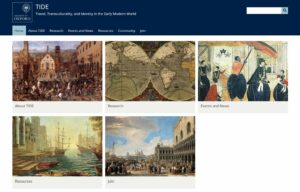
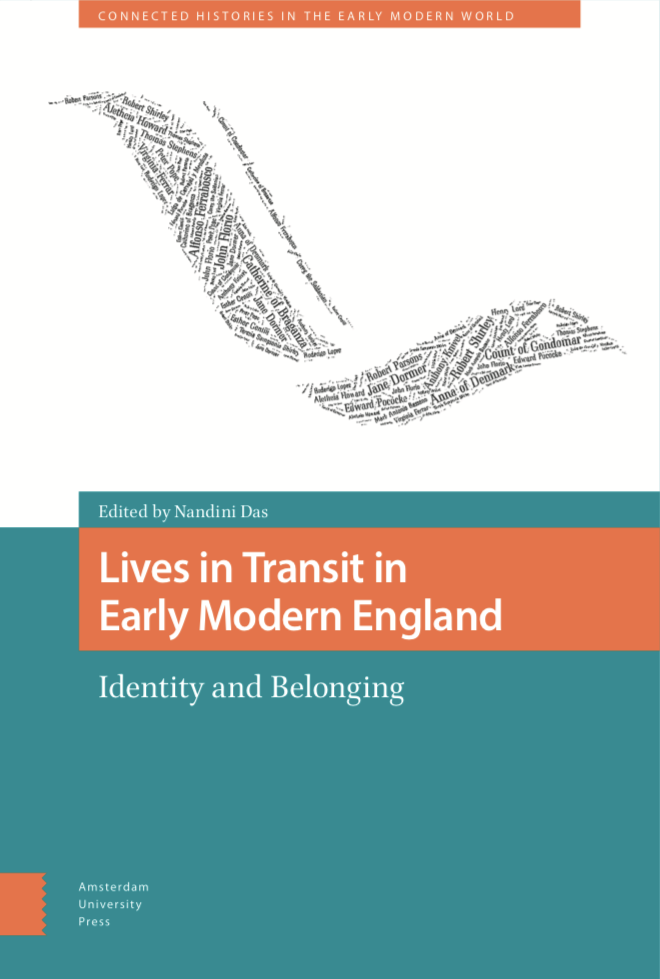
We are delighted to announce that the ERC-TIDE project’s second collaborative output, Lives in Transit in Early Modern England, is now available in print and online open access with Amsterdam University Press! This collection of 24 microhistories explores the lives of transcultural figures in the period, and the ways in which border-crossers of all kinds negotiated a place for themselves in a new language, country, or culture and navigated the often exclusionary parameters of belonging. They also reflect on our own methods of knowledge production, particularly in places where the archival presence is limited or heavily mediated.
The subjects of Lives in Transit are drawn from a range of professions, nationalities, preoccupations, and social statuses. Though not exhaustive, the selection represents a wider variety of the peoples who moved, voluntarily or otherwise, across borders and boundaries in this age of travel. Each of the subjects had different imperatives for moving in and out of England, and to reflect these, the microhistories are divided into four separate but often intersecting sections. ‘In and out of the state’ focuses on those whose connections and mobility allowed them to act directly or indirectly as agents of the state, whilst ‘Intellectual Exchange’ explores a selection of figures with valuable skills that allowed them to transfer knowledge across linguistic and cultural boundaries. ‘Conversions and Conversations’ looks at figures wrapped up in the religious dynamics of the period as evangelisers or converts, whilst the final section, ‘Managing Liminality’ shines a light on the problems and possibilities of living a transcultural life in-between, and how these continue to inflect our historiographical approaches.
You can access and download Lives in Transit in Early Modern England free of charge by clicking here. If you find the volume interesting or useful for your research and teaching, please let us know via Twitter @ERC_TIDE!
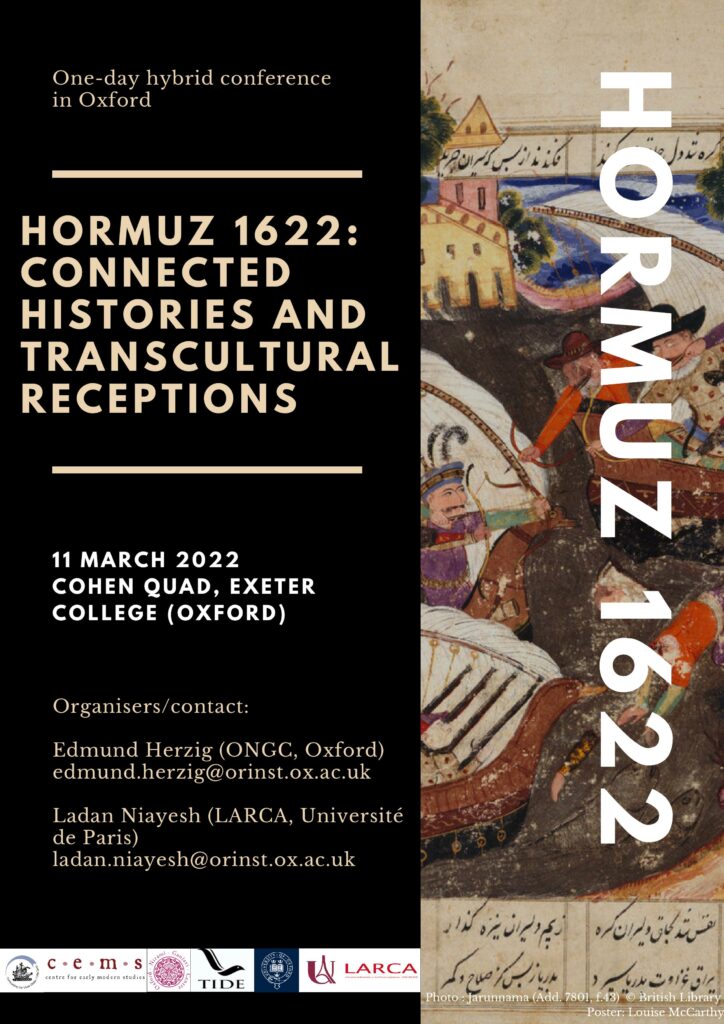
Clear your schedule and join us on 11 March for the one-day hybrid conference, ‘Hormuz 1622: Connected Histories and Transcultural Receptions’! The 1622 capture of Hormuz by the joint forces of Safavid Persia and the British East India Company was a defining moment in the history of Iran’s relationships with Europe. Strategically situated at the mouth of the Persian Gulf, the island kingdom of Hormuz had been conquered by Afonso de Albuquerque in 1507 and made a vassal state to Portugal in 1515, remaining for more than a century thereafter a key military stronghold and a nexus of maritime trade in Portuguese hands. A catalyst of political interactions and a crossroads of economic and cultural interests, the fall of Hormuz offers a fascinating instance of the dynamics of globalization at work in the early modern period, interlocking identities and allegiances, confronting world views, political empires and commercial ambitions, reconfiguring communities and networks, repurposing histories and their receptions.
The conference will run online via Zoom and in-person at Exeter College, Oxford’s Cohen Quad. Please click here to download the conference proceedings. For more information, contact Ladan Niayesh at ladan.niayesh@orinst.ox.ac.uk or Edmund Herzig at edmund.herzig@orinst.ox.ac.uk. Click here to register for in-person attendance, and here to register for online attendance.
‘Hormuz 1622’ benefits from the support of the Oxford Centre for Early Modern Studies and the Oxford Nizami Ganjavi Centre, ERC-TIDE (Oxford), LARCA (CNRS, Université de Paris), and the Hakluyt Society.
February 22 saw two closing events for the TIDE project. The first, ‘Lost Voices’, was a special literary event featuring TIDE's current visiting writer, the award-winning author and academic Elif Shafak; Bodley's Librarian and author of Burning the Books: A History of Knowledge Under Attacks, Richard Ovenden, and TIDE’s director, Nandini Das. This event saw the three speakers discuss the possibility of recovering lost historical voices through literature, bringing in ideas of lost books, archival preservation, and how to protect knowledge.
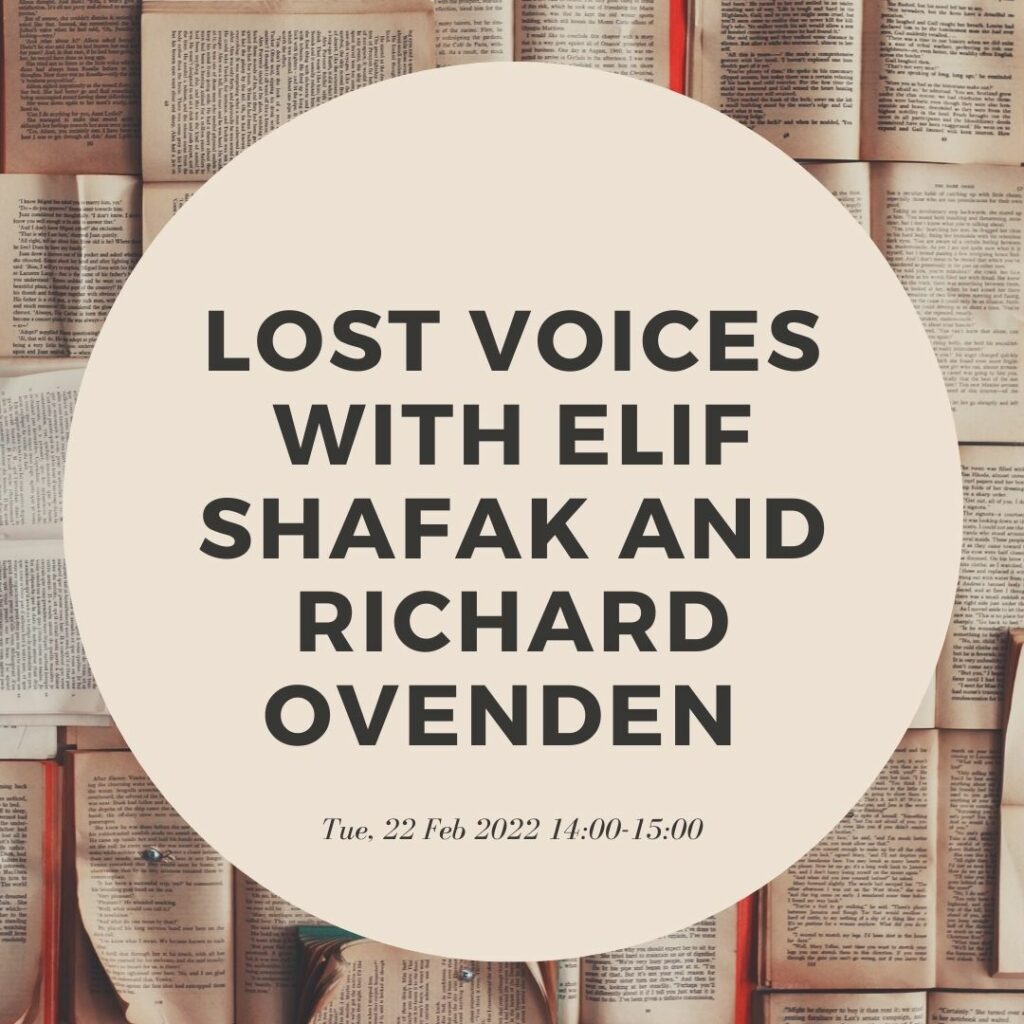
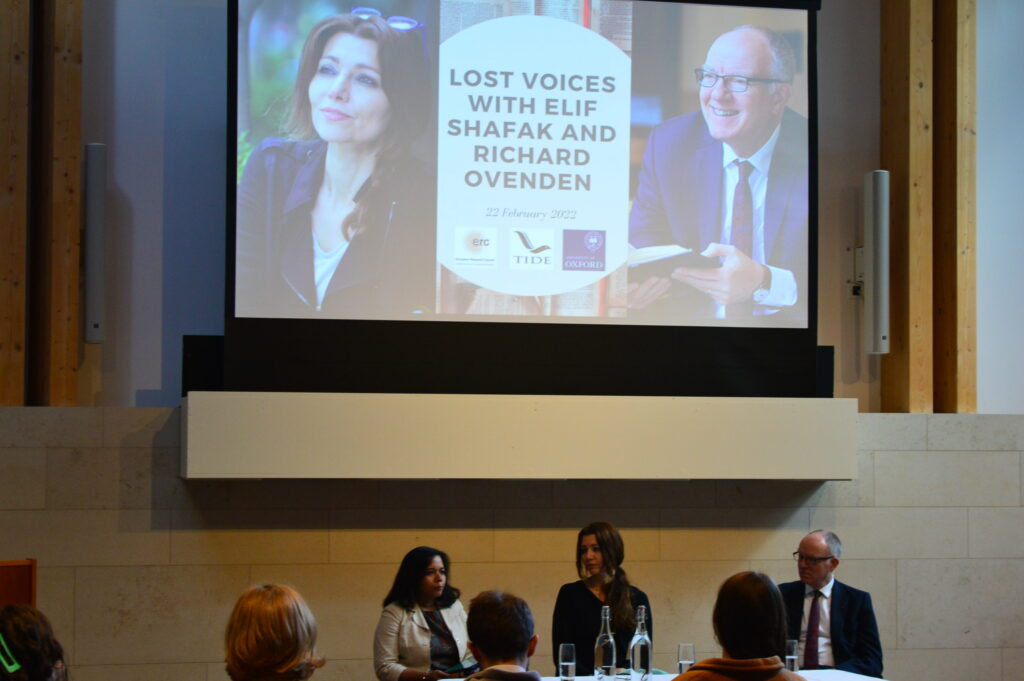
This rich discussion was followed later in the evening by a book launch for the latest two monographs produced by members of the TIDE team: Religion and Governance in England’s Emerging Colonial Empire, 1601–1698, by Haig Smith, and Jesuit and English Experiences at the Mughal Court, c.1580-1615 by João Vicente Melo. The launch, chaired by Edmond Smith, discussed links between colonial governments and religion, bringing in questions of language learning, the dissemination of printed work, and the exploitation of national rivalries in the pursuit of commercial and geopolitical agendas.
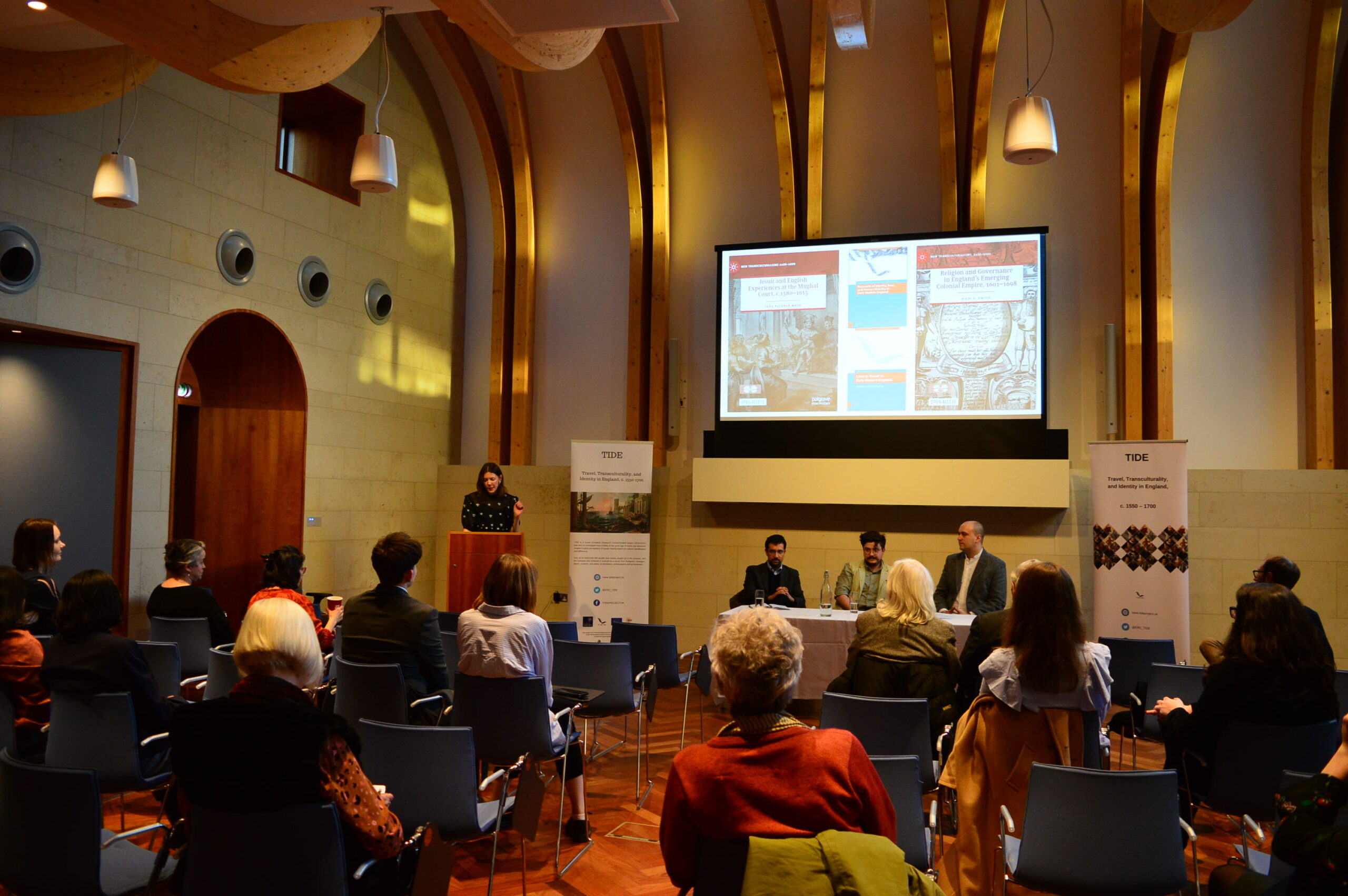
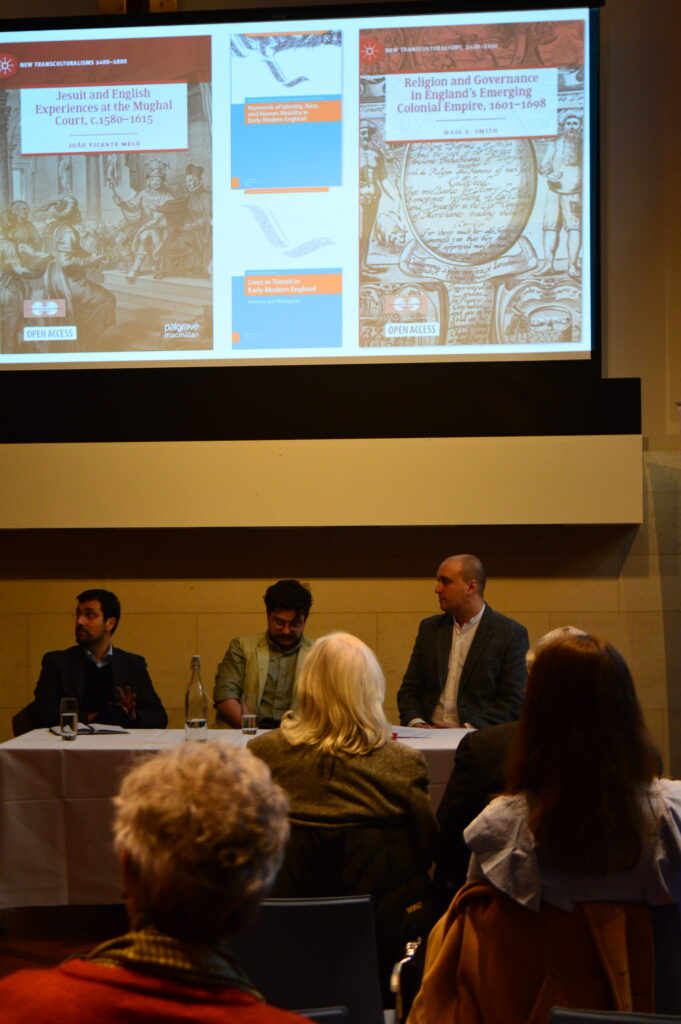
The day closed with a drinks reception celebrating the achievements of TIDE over the past six years, featuring a personalised cake!
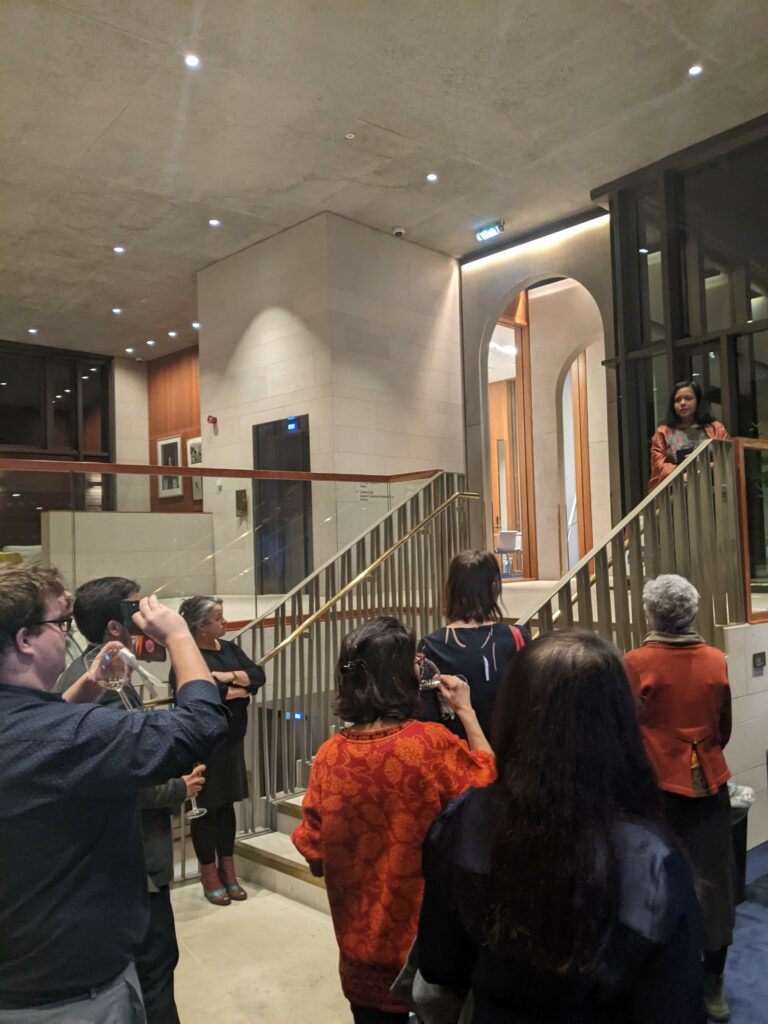

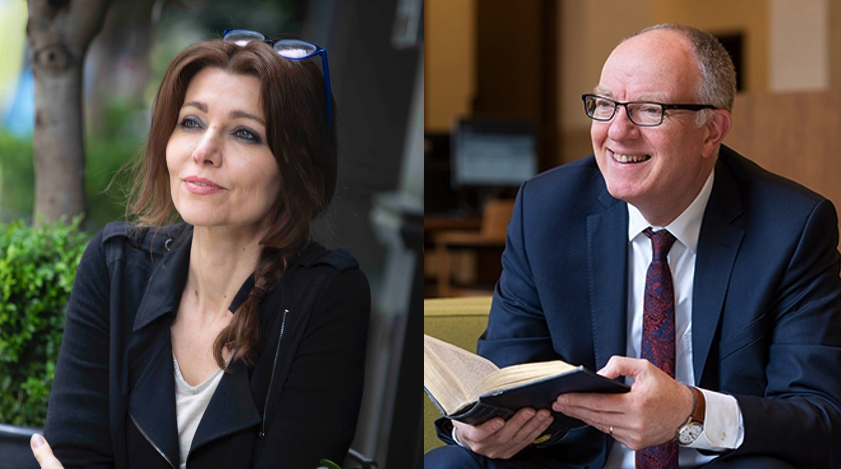
To mark the fifth anniversary of the ERC-TIDE project (Travel, Transculturality, and Identity in England, c.1550-1700), join the team for ‘Lost Voices’, a special literary event featuring the award-winning author and academic, Elif Shafak, Bodley Librarian, Richard Ovenden, and TIDE’s director, Nandini Das. The speakers will discuss Elif's work and the possibility of recovering lost historical voices through literature.
This hybrid event will run online via Crowdcast and in-person at Exeter College’s Cohen Quad from 14:00-15:00 on Tuesday 22 February. Click here to sign-up for the in-person event, and here to watch via the online livestream.
Elif Shafak is an award-winning British-Turkish novelist whose work has been translated in 54 languages. She writes in both Turkish and English, and has published 18 books, 11 of which are novels. In December 2020, the Royal Society of Literature announced her election as a Vice-President of the RSL. Her latest novel The Island of Missing Trees was shortlisted for the Costa Novel award 2021, while her previous work 10 Minutes 38 Seconds in this Strange World was shortlisted for the Booker Prize and RSL Ondaatje Prize, and The Forty Rules of Love was chosen by the BBC as one of the 100 Novels that Shaped Our World. Shafak holds a PhD in political science and has taught at various universities in Turkey, the US and the UK, including St Anne's College, Oxford University, where she is an honorary fellow. She is TIDE’s Visiting Writer for 2021/2022, and in this role has worked closely with the core team to produce new writing in response to research. For more information on the TIDE Visiting Writer Scheme, and past writer’s in residence, click here.
Richard Ovenden has been Bodley’s Librarian (the senior Executive position of the Bodleian Libraries, University of Oxford) since 2014. He is a Fellow of the Society of Antiquaries, the Royal Society of Arts, and a Member of the American Philosophical Society. Richard has written extensively on professional concerns of library and information management, on the history of photography, and has written a history of the deliberate destruction of knowledge, Burning the Books: A History of Knowledge Under Attacks (2020).
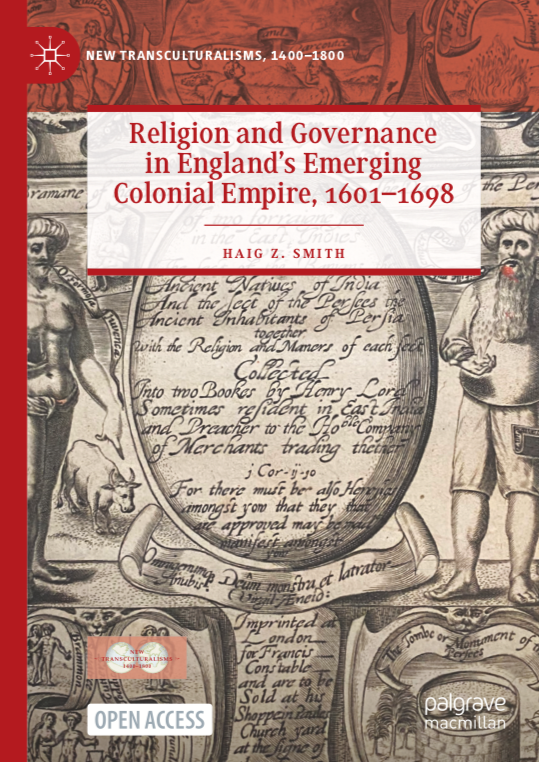
We are thrilled to announce that our very own Haig Smith has published his first monograph, Religion and Governance in England’s Emerging Colonial Empire, 1601–1698. Haig's research provides an important new look at the structure of the British government’s imperial expansion in the seventeenth century. Focusing on English overseas companies and their relationship to an English ‘governmental identity’, he argues that these companies provide an important link between colonial governments and ‘religious governance’ as England developed an empire.
Unsurprisingly, the monograph has already received rave reviews. William Pettigrew (Lancaster) has emphasised its “conceptual precision” and “expansive, global field of view”, and Thomas Leng (Sheffield) says “It will be a valuable read for anyone wishing to learn about how England established a presence in the wider world.” This brilliant volume is available open-access - just click here!.
To register, sign up via Eventbrite (https://bit.ly/31UARAW for in person attendance, or https://bit.ly/34KhfR4 for online). We hope that offering a hybrid mode of attendance will support participants who would rather not attend in person in light of current Covid levels: please email hakluyt.oxford.paris.2022@gmail.com if you have any questions.
Schedule:
9:00-9:15 — Coffee and Introductory Remarks
9:15-10:45 — Keynote: Anthony Payne - 'Hakluyt and France: People, Politics and Publication'
10:45-11:15 - Break
11:15-12:30 — Panel:
Bernard Allaire - 'The lost manuscripts of Cartier and Roberval's expedition to Canada (1541-1543)'
Pierre-Ange Salvadori - '‘Hakluyt, Guillaume Postel and the Arctic: inventing a “site of mediation” in Late-Renaissance Paris and Europe'
Katherine Ibbett - 'Certain signs: on Indigenous emotion in translation'
12:30-14:00 — Lunch
14:00-15:30 — Keynote: Frank Lestringant - 'When Richard Hakluyt meets André Thevet (1583-1588)'
15:30-15:45 — Coffee break
15:45-16:25 — Lightning talks & Discussion:
John Carrigy - “Richard Hakluyt as historian”
Lucas Aleixo Pires dos Reis - “The Account of Richard Rainolds and Thomas Dassel: commercial competition between the English, French, and Portuguese in the late 16th century Senegambia”
Nathalie Jeter - “‘Le plus beau & le meilleur païs que j’aie encore vu’: eyewitness as device in the recruitment pamphlet of Durand de Dauphiné”
Noah Michaud - “Prompts for African Principall Navigations: Knowledge of Africa Circulating in France at Hakluyt’s Arrival”
16:35-16:40 — Break
16:40-17:00 — Closing paper:
Ladan Niayesh - “The French Mediator in English Voyage Drama: Fletcher and Massinger's The Sea Voyage (1622)"
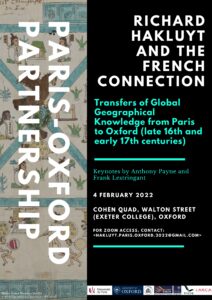

The University of Oxford’s European Research Council funded TRACTION project is pleased to offer the TRACTION Teacher Fellowship scheme and invites applications from UK based teachers of English and History currently working in secondary schools.
This free online programme of training and professional development will provide successful applicants with research informed approaches to the teaching of race, belonging, migration and empire in secondary schools. The Fellowship will give selected research participants access to the TRACTION Teaching Toolkit, which is an online platform consisting of three specialist, interdisciplinary modules from the sixteenth century to the present day. The contextual content modules are underpinned and supported by a fourth module on educational theory and pedagogy. Teachers undertaking the Fellowship will participate in the programme through an online learning format providing teachers with the flexibility to complete the activities at their own pace and to suit individual schedules and commitments. The flexible online resources will encourage fellows to design new lessons to be disseminated to colleagues, networks, and regions via the online platform.
TRACTION aims to build a teaching and learning community that can support the continued professional development of teachers. Fellows will be key research participants in the TRACTION project and vital members of the TRACTION community drawing upon their learning to act as ambassadors in the development of the platform.
In addition to free access to the TRACTION platform and related training, TRACTION Fellows will be paid £150 for their participation in the programme. The Fellowship will take place from 1st March 2022 until 11th April 2022. Selected TRACTION Fellows will be expected to spend around 2.5 hours of reading and reflection per week during that period. As part of their contribution to the development of this pioneering online platform, they will be required to participate in regular feedback for the purposes of reporting, monitoring, and improving the site. Fellows are encouraged to share teaching resources developed from their work on TRACTION by 22nd July 2022. They will be willing to collaborate actively with other Fellows, stakeholders, Oxford academics and advisors.
For more information please visit the TRACTION website.
Application deadline 4th February 2022.
Please download the TRACTION Teacher Fellowship Application Form and send completed forms to traction@ell.ox.ac.uk
Finalisation of participants: 18th February 2022.
If you have any questions about the scheme in advance of applying, please contact TRACTION Research Associate, Wendy Lennon: wendy.lennon@ell.ox.ac.uk.
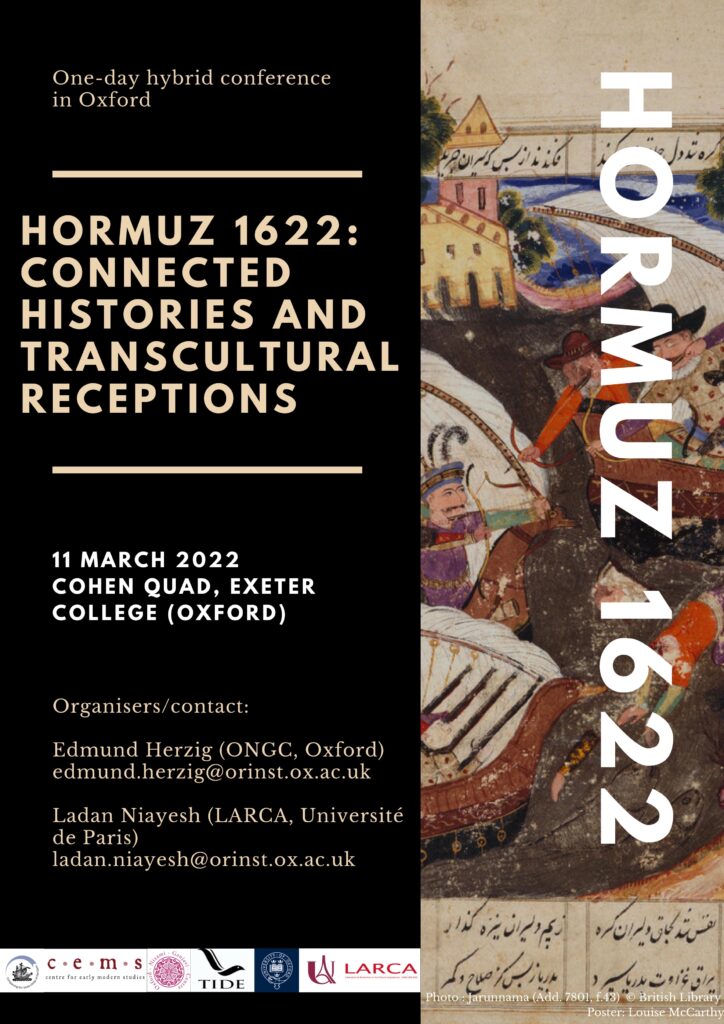 The call for papers for 'Hormuz 1622: Connected Histories and Transcultural Receptions' is now open! Organised by Professors Edmund Herzig (ONGC, Oxford) and Ladan Niayesh (LARCA, Université de Paris), this one-day hybrid conference hosted online and in-person at Exeter College, Oxford focuses on the recapture of the island of Hormuz by a coalition of Safavid and British East India forces, and aims to bring together the many transcultural accounts of it. Some proposed topics include how geopolitics and trade intersect, literary and artistic representations, and the role of contact zones and memory sites. The deadline for abstracts (max 300 words) and a biographical statement (max 100 words) is 15 January 2020 and should be sent to Edmund Herzig (edmund.herzig@orinst.ox.ac.uk) and Ladan Niayesh (ladan.niayesh@orinst.ox.ac.uk). A selection of papers will be published in a special edition of a scholarly journal.
The call for papers for 'Hormuz 1622: Connected Histories and Transcultural Receptions' is now open! Organised by Professors Edmund Herzig (ONGC, Oxford) and Ladan Niayesh (LARCA, Université de Paris), this one-day hybrid conference hosted online and in-person at Exeter College, Oxford focuses on the recapture of the island of Hormuz by a coalition of Safavid and British East India forces, and aims to bring together the many transcultural accounts of it. Some proposed topics include how geopolitics and trade intersect, literary and artistic representations, and the role of contact zones and memory sites. The deadline for abstracts (max 300 words) and a biographical statement (max 100 words) is 15 January 2020 and should be sent to Edmund Herzig (edmund.herzig@orinst.ox.ac.uk) and Ladan Niayesh (ladan.niayesh@orinst.ox.ac.uk). A selection of papers will be published in a special edition of a scholarly journal.
Full details for the conference, and the topics and deadlines for papers, can be found here.
We are delighted to announce that two TIDE interns have joined the team to help with the day-to-day running of the project and create new, exciting content for both the project website and our social media channels.
Dominic Madera is reading a second BA in English at Exeter College, Oxford, funded by the Donovan-Moody Fellowship from Williams College in the United States. At Williams, he received an Honors BA in English and Comparative Literature with a concentration in Border, Diaspora, and Exile Studies. His thesis, ‘Zadie Smith and the Empire of the Everyday,’ focused on the embed of a modernist, intertextual discourse in the fiction of Zadie Smith and argued that its use attempts to revisit and resituate modern conceptions of nation and empire in the contemporary everyday. He previously worked under Professors Kathryn Kent as a Roche Fellow, James Pethica as a Class of 1957 Research Fellow, and, with Laura Martin, on a forthcoming Harvard University Press monograph. These projects ranged from analyzing the Queer Poetics of Emily Dickinson and the modernism of Lady Gregory to the political history of American conservation. Dominic’s primary research interests reside in intertextuality and cultural interaction, especially how contemporary literature writes with and against earlier genres and forms. His interests also include gender theory, psychoanalysis, travel writing, and the interaction between American literature and anglophone colonialism. As part of the TIDE project, Dominic will be primarily working on archiving website content, and sourcing, creating, and publishing new material online.
Natasha Kee is a third-year History and English student at Exeter College, Oxford. Her research interests include the English Reformation’s influence on art and devotional literature, early modern concepts of republicanism, and Shakespeare. Natasha is particularly interested in the meeting points of History and English in this period and the ways in which politics and literature interacted. She is currently writing her undergraduate thesis on how the writings of Catholic mothers, such as Elizabeth Carey and Elizabeth Grymeston, helped create and maintain a Catholic community in Protestant England. As part of the TIDE project, Natasha will be collaborating with and supporting the wider TIDE team. She will mostly be working on the project’s social media presence, and promoting upcoming events and publications. She is excited to be joining the team and helping maintain these resources, which have been invaluable for her own studies, for future generations of students and researchers.
We are all very excited to work closely with Dominic and Natasha over the next few weeks, and hope you will join us in extending a warm welcome to them both.

‘From Middle Temple to Manoa: Global Networks at the Early Modern Inns of Court', an exhibition at the Middle Temple Library curated by TIDE researchers, Lauren Working and Emily Stevenson, has made quite a splash since opening in September 2021. Click here to read Jackie Watson's glowing review of 'this little gem of an exhibition'!
‘From Middle Temple to Manoa’ encourages visitors to both think about the influence of global interests on the social lives and self-fashioning of Inns gentlemen, and to consider the geopolitics of production and exploitation that became ingrained in elite notions of civil refinement. You can read and download the exhibition catalogue here.
We are delighted to announce that the Call for Lightning Papers for 'Richard Hakluyt and the French Connection: Transfers of Global Geographical Knowledge from Paris to Oxford (late 16th – early 17th c)' is now open. This will be a one day event, held in Oxford on 4 February 2022, organised as part of the The Paris-Oxford Partnership (POP) Early Career Researcher Partnership Programme, and organised jointly by TIDE postdoctoral researchers Dr Lauren Working and Dr Emily Stevenson, and Louise McCarthy from the Université de Paris.
Graduate students and early career researchers are invited to present a short paper (5 minutes) at the event as part of a lightening talk panel: further details can be found below in the full Call for Papers, and papers may be presented in person or over Zoom.
Abstracts (150 words) in English should be sent along with a short biographical note (100 words) to <hakluyt.paris.oxford.2022[at]gmail.com > by 5 December 2021. Please email if you have any further queries. Notifications will be sent by 20 December 2021.
Call for Lightning Papers: Richard Hakluyt and the French Connection
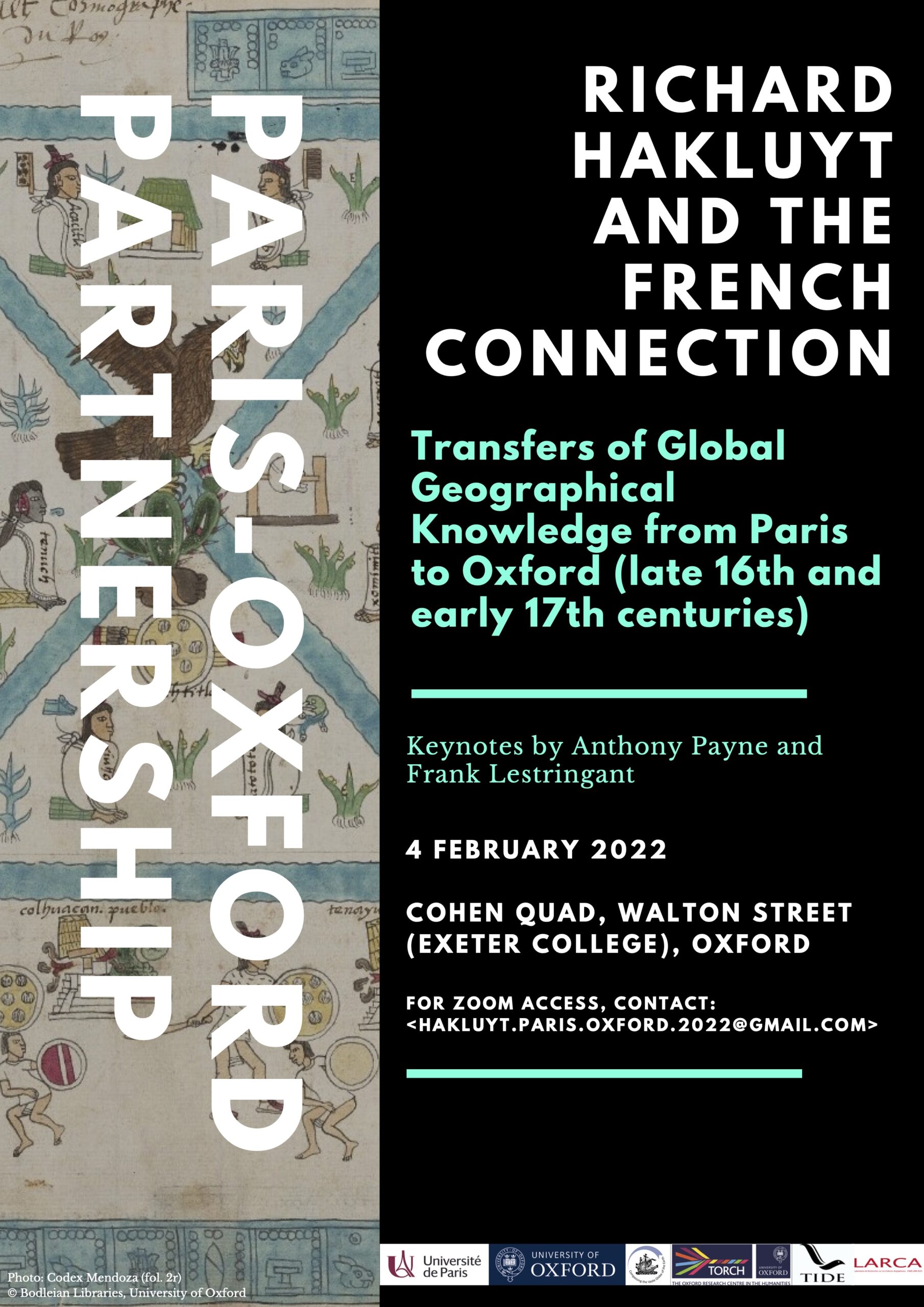
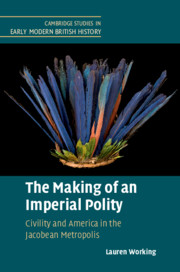 It is with great pleasure that we announce that our very own Dr Lauren Working has been awarded the Whitfield Prize for 2021 for her excellent first monograph, The making of an imperial polity civility and America in the Jacobean metropolis. She shares the prize with Dr Jackson Armstrong for his book, England's Northern Frontier .
The Whitfield Book Prize has become one of the most sought after book prizes for early career historians. It was established by the Royal Historical Society in 1976 at the bequest of Professor Archibald Stenton Whitfield, who was a Fellow of the Society from June 1916 until his death in 1974.
The judges cited that 'This masterful study of Jacobean political culture significantly shifts our understanding of its imperial nature. Lauren Working weaves together material history, political thought, and historical anthropology to show that settler colonialism was central to the self-understanding of Jacobean political actors. She deftly unpicks the connections between settler plantation and domestic estate management, and shows how metaphors of cannibalism were used to equate Catholics with Native Americans, while legitimating and masking the violence of the colonial project itself.
By placing America at the heart of the Jacobean polity, rather than on its periphery, Working reveals that the idea of English civility was expansionist and imperial from the outset. Elegantly written and compellingly argued, her book makes a major contribution to the field.'
Dr Working's 'masterful study' is available open access here
It is with great pleasure that we announce that our very own Dr Lauren Working has been awarded the Whitfield Prize for 2021 for her excellent first monograph, The making of an imperial polity civility and America in the Jacobean metropolis. She shares the prize with Dr Jackson Armstrong for his book, England's Northern Frontier .
The Whitfield Book Prize has become one of the most sought after book prizes for early career historians. It was established by the Royal Historical Society in 1976 at the bequest of Professor Archibald Stenton Whitfield, who was a Fellow of the Society from June 1916 until his death in 1974.
The judges cited that 'This masterful study of Jacobean political culture significantly shifts our understanding of its imperial nature. Lauren Working weaves together material history, political thought, and historical anthropology to show that settler colonialism was central to the self-understanding of Jacobean political actors. She deftly unpicks the connections between settler plantation and domestic estate management, and shows how metaphors of cannibalism were used to equate Catholics with Native Americans, while legitimating and masking the violence of the colonial project itself.
By placing America at the heart of the Jacobean polity, rather than on its periphery, Working reveals that the idea of English civility was expansionist and imperial from the outset. Elegantly written and compellingly argued, her book makes a major contribution to the field.'
Dr Working's 'masterful study' is available open access here 
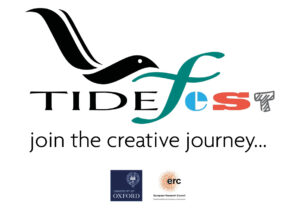 Following our ‘On Belonging’ conference, the TIDE project (Travel, Transculturality and Identity in England, 1550–1700) is delighted to announce TIDEfest, a free online literary festival to be held the weekend of 31 July & 1 August.
TIDEfest will bring together all five of the project’s visiting writers, as well as a number of scholars, teachers, and artists. Over the course of the weekend, the festival will feature a virtual programme of events including a book reading with Elif Shafak and a discussion on globes and world-making with the artist Loraine Rutt. The festival will include a creative writing workshop led by the poets Sarah Howe and Fred D’Aguiar, featuring a selection of historical objects introduced by the curators of four national museums.
TIDEfest is a celebration of the project’s 5-year engagement with creative practitioners since its inception in 2016, and will bring together people invested and interested in teaching, migration, curation, and collaboration. You can register for events through Eventbrite here, and the full programme is below. The festival is completely free and welcome to all. For any queries, please contact the TIDE project on Twitter (@ERC_TIDE), or by email (tide@ell.ox.ac.uk), and follow the festival on Twitter with #OnBelonging and #TideFest!
Following our ‘On Belonging’ conference, the TIDE project (Travel, Transculturality and Identity in England, 1550–1700) is delighted to announce TIDEfest, a free online literary festival to be held the weekend of 31 July & 1 August.
TIDEfest will bring together all five of the project’s visiting writers, as well as a number of scholars, teachers, and artists. Over the course of the weekend, the festival will feature a virtual programme of events including a book reading with Elif Shafak and a discussion on globes and world-making with the artist Loraine Rutt. The festival will include a creative writing workshop led by the poets Sarah Howe and Fred D’Aguiar, featuring a selection of historical objects introduced by the curators of four national museums.
TIDEfest is a celebration of the project’s 5-year engagement with creative practitioners since its inception in 2016, and will bring together people invested and interested in teaching, migration, curation, and collaboration. You can register for events through Eventbrite here, and the full programme is below. The festival is completely free and welcome to all. For any queries, please contact the TIDE project on Twitter (@ERC_TIDE), or by email (tide@ell.ox.ac.uk), and follow the festival on Twitter with #OnBelonging and #TideFest!
Saturday 31 July 2021
11:00–12:30 Teaching Migration, Empire and Belonging in Schools 14:00–15:30 Preti Taneja in Conversation with Nandini Das 17:00–18:30 Giving Voice with Sarah Howe and Fred D’Aguiar, Part 1 19:30–21:00 The Stories We Tell with Nikesh Shukla, Yashica Dutt & TanaïsSunday 1 August 2021
14:00–15:30 Globes, Networks, & the Early Modern World 17:00–18:30 Elif Shafak in Conversation with Nandini Das 19:30–21:00 Giving Voice with Sarah Howe and Fred D’Aguiar, Part 2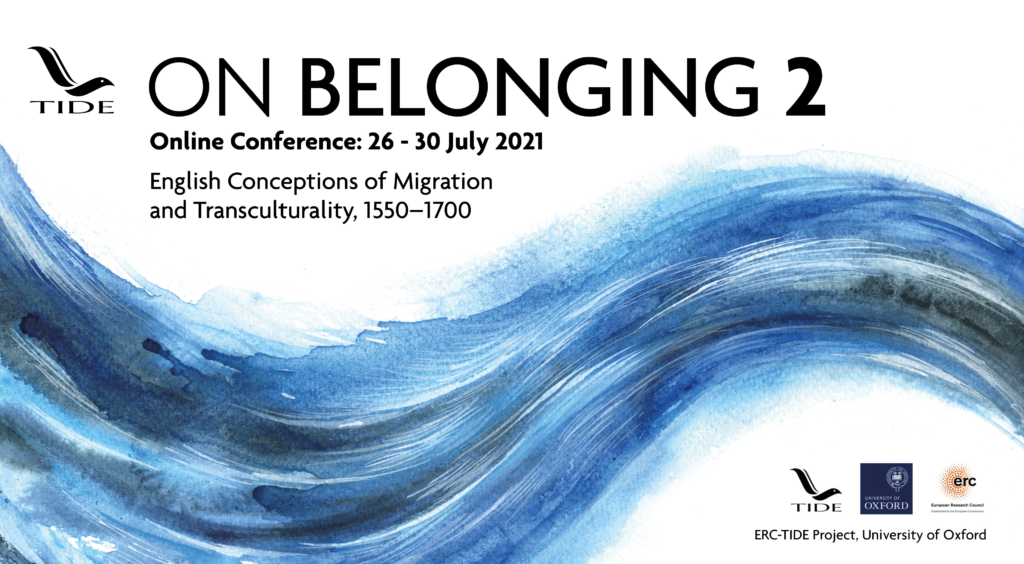
We are delighted to announce that registration is now open for TIDE's online summer conference, ‘On Belonging 2: English Conceptions of Migration and Belonging, 1550-1700’ (27-30 July 2021). Join us as we explore questions of identity, migration, and belonging in the early modern period through a range of panels, discussions, roundtables, lightning talks, and creative sessions. For more information, including conference proceedings and the TIDE Equality, Diversity, and Inclusivity statement, click here.
Registration is open until Friday 16 July through Eventbrite: just click here and input your details as requested. While the conference is free to attend, we do encourage those in permanent, full-time employment to donate to the Society of Renaissance Studies. The SRS supports scholarly activity at all stages by providing annual postdoctoral fellowships, conference support, public engagement awards, doctoral scholarships and support for students at MA level. For more information and to donate, please click here.
We look forward to seeing you all at ‘On Belonging 2’, and hope that you will also join us the following weekend for TIDE-fest (31 July- 1 August). This 2-day literary festival will feature a range of events, including Q&As, writing workshops, and discussions with authors and creatives, including TIDE Visiting Writers Fred d’Aguiar, Sarah Howe, Nikesh Shukla, Preti Taneja, and Elif Shafak. More information and instructions on how to register for events will be available on the TIDE website in due course.
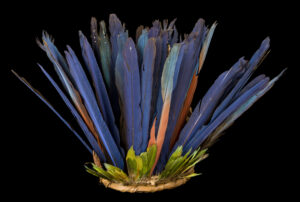
TIDE is pleased to announce that our very own Dr Lauren Working has been shortlisted for the RHS Whitfield Book Prize 2021 for her first monograph, The Making of an Imperial Polity: Civility and America in the Jacobean Metropolis (Cambridge University Press, 2020). Focusing on Elizabethan and Jacobean politics, sociability, and empire, Dr Working’s book explores how colonization infused political culture and transformed ideas of civil refinement in London in the early seventeenth century through political discourse, literature, and objects. The Whitfield Book Prize has become one of the most prestigious book prizes for early career historians, and we hope you will all join us in congratulating Lauren on this outstanding achievement and wishing her best of luck! Read more around the prize and nominees here.
TIDE is pleased to announce a collaboration with the AHRC-funded Middling Culture project, directed by Professor Catherine Richardson at the University of Kent. Middling Culture examines the cultural practices of the oft-neglected ‘middling sort’, an urban and literate social group to which some of the most significant prose and dramatic writers of the period belonged. As the team are keen to stress, this expansive group was neither ethnically nor culturally homogenous, but rather reflected the increasing plurality of England’s urban centres and the transcultural lives of its inhabitants. By collaborating on educational materials and resources, TIDE and Middling Culture aim to draw further attention to the fluidity of the middling sort, and those particularly mobile figures who moved across borders and boundaries of all kinds, resisting easy categorisation.
Researchers on the TIDE project have produced blogposts on three transcultural London residents using the Middling Culture Social Status Calculator, an interactive tool that determines the status of a subject with questions about property holdings, employment, and social networks. All three offer a fresh perspective on the lives of these figures: where, for example, will it place Luisa de Carvajal, a noblewoman who renounced her wealth, took a vow of poverty and perfection, moved to a new country, and pitted herself against Protestant authorities in London? What about Joan Lete, the daughter of an exceptionally wealthy Turkey Company merchant whose stability depended on far flung ships returning home? Or the celebrated ‘Englishman in Italiane’, John Florio, the London-born son of migrants and champion of Italian culture and language in England?
These blogs aim to highlight the changing and transcultural lives of the people who lived in England’s urban centres. The calculator, as a tool, helps to show how figures exercised agency in navigating the legal and cultural structures of inclusion and exclusion: we find a stranger tracing the cultural and spiritual practices of her home country onto a new urban landscape, a merchant’s daughter establishing the wealth and power of her family through matrimony, and a second-generation migrant using the cultural authority of his alien inheritance to forge an extraordinarily versatile and productive career. Read more here!
The conference will reflect on how processes of global exchange in the early modern period influenced English identity, and how the movement of peoples, objects, and ideas across the globe shaped English concepts of belonging both at home and abroad. In keeping with our aim to encourage conversation and exchange, we are moving away from the model of single-scholar keynotes, and we welcome interventions from a variety of approaches, methodologies, and disciplines. The full call for papers can be downloaded here: On Belonging 2 CfP.
We would be happy to answer any queries. Please send abstracts of up to 300 words along with a short biographical note including institutional affiliation (250 words) to tide@ell.ox.ac.uk by 30 April 2021.
Following ‘On Belonging 2’, attendees are invited to TIDE-fest, a weekend series of public events between 31 July – 1 August which will include Q&As, readings, panels, creative writing workshops, and family-friendly events led by the TIDE Visiting Writers. More details will be released soon: registration will be free, and all events will take place online.
Dr Roberts' research looks at England’s interaction with the commedia dell’arte during the late sixteenth and early seventeenth centuries, and how the form manifested itself in the cultural imagination of early modern London. He also investigates the effects of human migration to sixteenth-century London and the small population of Italian merchants, scholars, and liberal artisans residing in the City’s wards. His thesis is an original and wide-reaching study that makes a significant contribution to scholarship on the migration of people, culture and ideas across early modern Europe.
It has been a privilege to have had Dr Roberts on the TIDE team for the past three years as a DPhil student, and we look forward to continue working together as Tom takes up his new role of Research Associate on the project. In-person celebrations are on the horizon, but until then, we are sure you will all join us in congratulating him on this incredible achievement!

In preparation for our final conference in July 2021, we are very pleased to announce that Dr Sam Robinson has joined TIDE to help plan and deliver the digital extravaganza.
Following an ERC-funded PhD at the Centre for the History of Science, Technology, and Medicine of the University of Manchester as part of the Earth Under Surveillance Project, Dr Robinson completed his first book on ocean sciences at the National Institute of Oceanography during the Early Cold War: Ocean Science and the British Cold War State (2018). Since 2018, he has been a member of the Horizon 2020 European Commission-funded InsSciDe project and is currently a member of the Making Climate Histories Project at the University of Cambridge.
Dr Robinson is the Conference Chair of the British Society for the History of Science. In 2020, he was part of the organising team for the British Society for the History of Science Global Digital History of Science Festival which utilised Crowdcast to broadcast public and academic content to 1500+ participants in 56 countries around the world.
We very much look forward to Sam joining us over the next few months as we plan our digital conference ‘On Belonging 2’ and the very exciting events around it.
We at TIDE are delighted to congratulate our very own Dr Emily Stevenson for successfully defending her thesis, ''Incorporate into one body torne and scattered limmes': Recontextualising Principal Navigations within the networks of Richard Hakluyt'.
Dr Stevenson's research focuses on reconstructing the networks, both textual and social, which surrounded late sixteenth-century English travel writers. She is particularly concerned with Richard Hakluyt, the editor of both editions of The Principal Navigations, Voyages, Traffiques and Discoveries of the English Nation, a major source for the history of Elizabethan travel and narratives of early English empire. Her research deconstructs the work back into its constituent parts, and uses network analysis to examine the societal structures which influenced Hakluyt’s editorial choices and textual analysis to closely study the effects of this process on the text itself. It is an innovative and wide-reaching study that makes a significant contribution to scholarship on early modern travel and travel writing.
It has been a privilege to have had Dr Stevenson on the TIDE team for the past three years, and we look forward to continuing working together as Emily takes up her new role of Research Associate on the project. In-person celebrations are on the horizon, but until then, we are sure you will all join us in congratulating her on this incredible achievement!
Every year, BBC Radio 3 and the Arts and Humanities Research Council (AHRC) hold a nationwide search for academics with game changing ideas that will resonate with a wide audience, and it is with great pleasure that we can announce that Dr Lauren Working has been named a New Generation Thinker.
These New Generation Thinkers represent some of the brightest minds in the country and their research has the potential to redefine our understanding of everything from our history to the way we speak.
The New Generation Thinkers will have the prestigious opportunity to communicate their research by making programmes for BBC radio. They will also be provided with unique access to training and support from AHRC and the BBC. New Generation Thinkers alumni have gone on to become prominent public figures in their fields as well as the face of major documentaries, TV series, and regular figures in public debate.
Lauren Working wants us to look at ruffs and colonial fashion, at plants and porcelain depicted in still life paintings. Her first book The Making of an Imperial Polity, and it explores how English colonial projects in the Americas, from Venezuela to Virginia, influenced taste and politics in early seventeenth-century London. She has published on topics including intoxicants and rituals of sociability, Jamestown archaeology, and Native American artefacts. Lauren freelances for the National Portrait Gallery and is developing projects that use material culture to explore the entangled histories of colonialism and English heritage.
We are very pleased to announce that Professor Nandini Das has been awarded an ERC Proof of Concept grant for her project TRACTION: Teaching Race, Belonging, Empire and Migration.
Issues of race, belonging, empire, and migration have been at the foreground of public consciousness globally in recent years. Our collective understanding of history and culture is often unsurprisingly at the centre of this discourse, with the foundational role of school education coming particularly under pressure. Imparting a full and complete understanding of issues of race and human mobility is in our collective interest, since the resulting diversity and social inclusion generate a range of socio-economic benefits, from increase in innovation and productivity, to the strengthening of social cohesion and racial equality.
The TRACTION project will draw on research which has undertaken by TIDE to develop a pioneering platform of training, resources, and community network in one place that will equip teachers to engage with issues of race, belonging, empire, and migration in the classroom. Its dual focus on skills-training and community-building is unique, and designed for both immediate and sustainable impact. It is also designed to be modular and expandable, cuts across subject-boundaries, and can be adapted to different national and international educational systems and examination boards.
The ultimate aim will be to translate TIDE’s research into a viable and innovative social enterprise that will remain available beyond the lifetime of ERC funding, with longstanding and far-reaching socio-economic and cultural impact.
Find out about more about the ERC’s Proof of Concept funding on the ERC website.
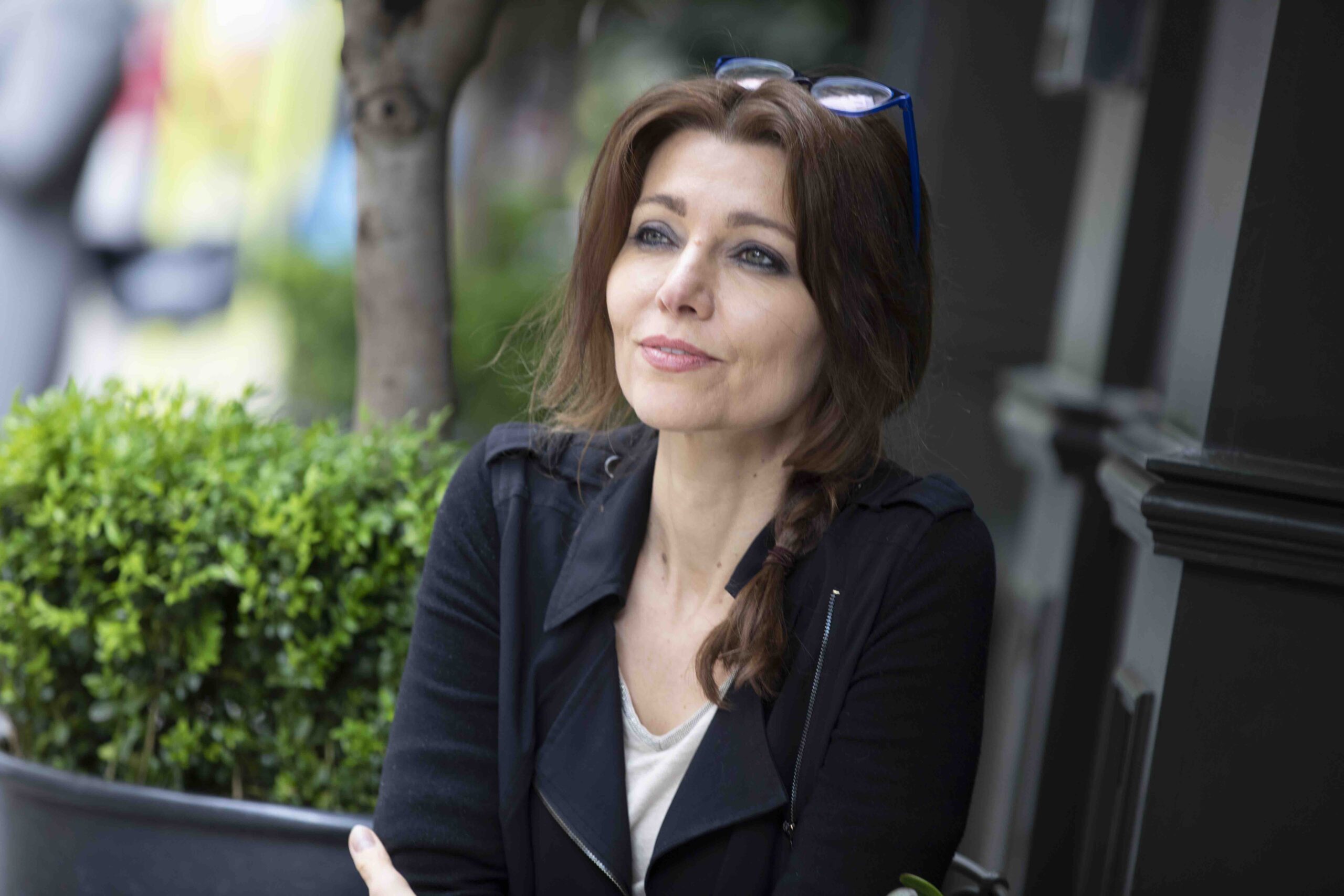
We are delighted to announce that this year’s TIDE Visiting Writer is Dr Elif Shafak. Elif is an award-winning British-Turkish novelist whose work has been translated in 54 languages. She writes in both Turkish and English, and has published 18 books, 11 of which are novels. In December 2020, the Royal Society of Literature announced Elif's election as a Vice-President of the RSL. Her latest novel 10 Minutes 38 Seconds in this Strange World was shortlisted for the Booker Prize and RSL Ondaatje Prize; and chosen as Blackwell’s Book of the Year. Her previous novel, The Forty Rules of Love was chosen by BBC among 100 Novels that Shaped Our World. Shafak holds a PhD in political science and she has taught at various universities in Turkey, the US and the UK, including St Anne's College, Oxford University, where she is an honorary fellow. To keep up to date with Elif’s work with TIDE, be sure to follow @ERC_TIDE on Twitter.
Join us for two evening sessions (5-6.30pm) on 9 & 11 November 2020
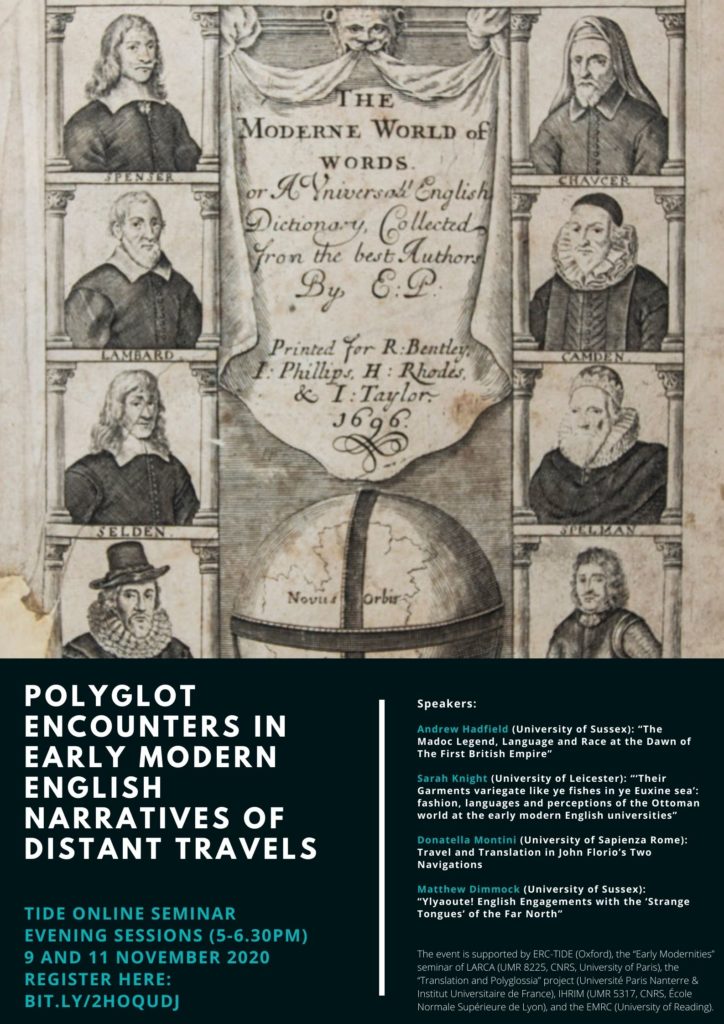
In an age of geographic discoveries and colonisation, easier communication, and international trade growing steadily from the mid-16th century, England gradually established itself as an Atlantic and global power, as a prelude to the formation of the British empire. English records of this era of expansion offer multiple examples of linguistic contacts with the wider world, with translations, lexical borrowings, and records of multilingual exchanges between travellers and the peoples they encountered.
These two online evening seminar sessions, jointly organised by TIDE (University of Oxford, ERC) and LARCA (University of Paris, CNRS), aim at exploring some of the practices and strategies underpinning polyglot encounters in travel accounts produced or read in England. Drawing on linguistic, lexicographic, literary and historical methodologies, we will look into some of the contexts and significances of these textual contact zones. Particular attention will be paid to uses of polyglossia in processes of identity construction, defining and promoting national or imperial agendas, appropriating and assimilating foreign linguistic capital, or meeting resistance and limits from linguistic and cultural others refusing to lend themselves to subaltern status.
The event is supported by ERC-TIDE (Oxford), the “Early Modernities” seminar of LARCA (UMR 8225, CNRS, University of Paris), the “Translation and Polyglossia” project (Université Paris Nanterre & Institut Universitaire de France), IHRIM (UMR 5317, CNRS, École Normale Supérieure de Lyon), and the EMRC (University of Reading).
Speakers:
Andrew Hadfield (University of Sussex): “The Madoc Legend, Language and Race at the Dawn of The First British Empire”
Sarah Knight (University of Leicester): “‘Their Garments variegate like ye fishes in ye Euxine sea’: fashion, languages and perceptions of the Ottoman world at the early modern English universities”
Donatella Montini (University of Sapienza Rome): “Travel and Translation in John Florio’s Two Navigations “
Matthew Dimmock (University of Sussex): “Ylyaoute! English Engagements with the ‘Strange Tongues’ of the Far North”
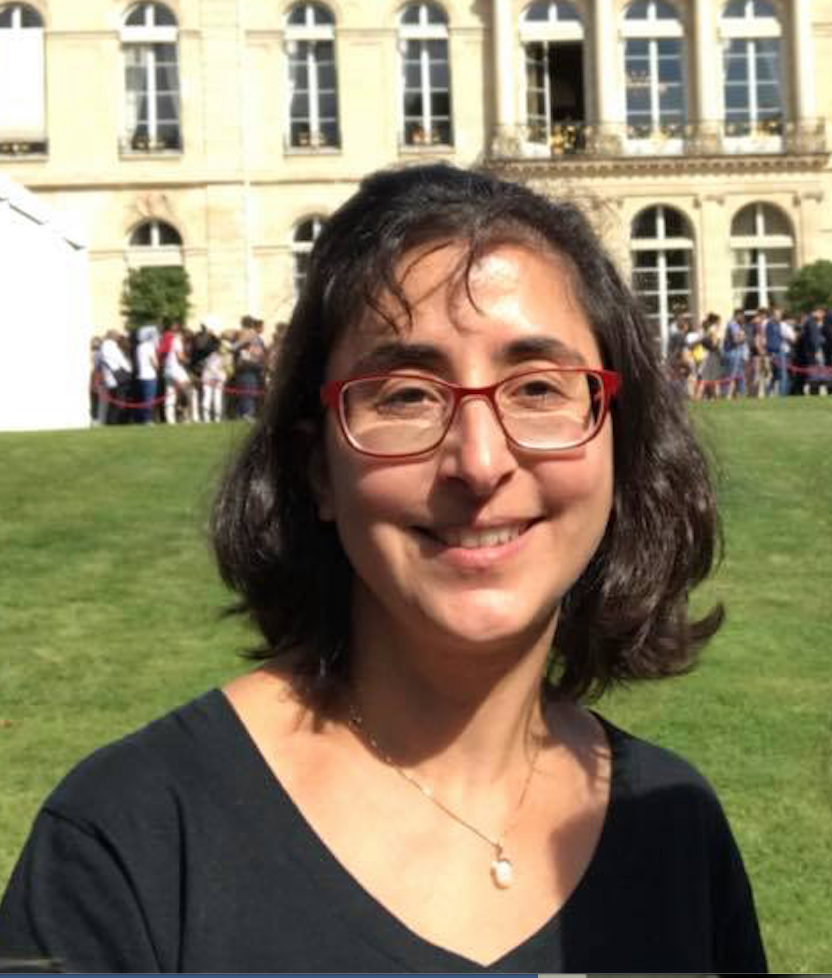
Ladan Niayesh is Professor of Early Modern Studies at the Université de Paris and a member of the LARCA research centre (UMR 8225, CNRS). She will be a Visiting Fellow at Exeter College over Michaelmas term 2020. Her research focuses on early modern travel writings and travel plays in English, with a special interest in travels to Muscovy and Persia. Her latest book-length publications include Three Romances of Eastern Conquest (MUP, 2018) and Eastern Resonances in Early Modern England: Receptions and Transformations (Palgrave Macmillan, 2019). Her forthcoming projects are a co-edition, with Kurosh Meshkat and Alasdair MacDonald, of documents related to the diplomatic missions of the Sherley brothers to and from the Sophy of Persia (contracted to the Hakluyt Society), and a monograph on Models of Race and Empire in Early English Accounts of Russians and Tatars (contracted to CUP). For the TIDE project, she will be organising this Autumn a set of online seminar sessions on “Polyglot encounters in early modern English narratives of distant travels”.
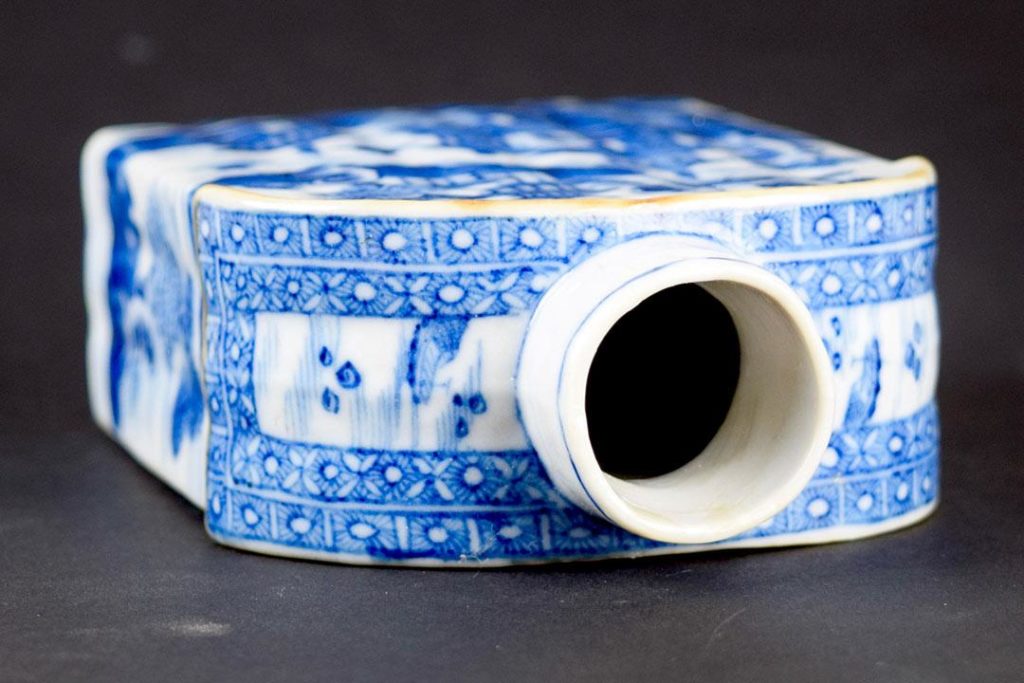
We are delighted to share ‘From Silk Roads to Tudor Ships: Poetry and Porcelain Dream-Worlds’, a collaboration between the World Museum and the TIDE project (Travel, Transculturality, and Identity in England, 1550 –1700). Our partnership brings curators, academic researchers, poets, filmmakers, and students together in a creative project that illuminates the histories of museum objects and their connection to contemporary issues of identity and belonging. This partnership will culminate in the permanent redisplay of the World Museum’s pre-modern Chinese ceramics in the World Cultures gallery, providing an immersive museum experience that threads the ceramics’ places of origin and migrations to their presence in the gallery. From the furnaces in Fujian, China to the cabinets of Renaissance Europe, and finally to the museum itself, these travelling porcelains connect us to global and historical currents.
'Wither would you go? What country/should give you harbour…?’
Based on TIDE and Runnymede Trust's pioneering Beacon Fellowship, this course material draws on the TIDE project’s Keywords essays to offer support for educators looking to teach migration, race, and identity, and to diversify their approaches to the National Curriculum. This mini course is concerned with how we incorporate a history of cross-cultural identities and a history of human mobility into the national story, drawing on material from the sixteenth and seventeenth century. It is our contention that this era is critical to understanding colonialism and its legacies. This was the time when the English first began to extend their authority over territories and peoples beyond the British Isles. Many of the ideas around civility, empire, citizenship, and race that underpinned subsequent colonial projects were first debated under the Tudors and Stuarts. As we explain below, each Reading Pack builds on several of our TIDE: Keywords essays, clustered in four themes: Belonging, Outsiders, Perceptions, and Empire.
We believe that developing conversations in schools about migration and transcultural identities – including the possibilities of being a ‘third thing’, belonging neither to one culture or another, but a mixture of them based on personal experiencing and adaptation – is integral to understanding our history and who we are today. We hope these resources can assist teachers who face the task of moving their teaching to online platforms and devising alternatives to school trips to museums and historic properties to engage with issues of cultural heritage and identity.
Each Reading Pack in this 4-part mini-course centres on one or more keywords, most of them terms of identification or categorization that offers a prism through which to explore key ideas around citizenship, belonging, and colonial/imperial legacies. Alongside the TIDE Keywords essays that address those specific terms, you will find a cluster of historical and literary excerpts, with brief explanatory headnotes. These can be used to spark conversations, open up debates, and prompt further activities or assignments.
- Please download the reading pack here:
- Introduction
- Belonging: Reading Pack 1
- Outsiders: Reading Pack 2
- Perceptions: Reading Pack 3
- Empire: Reading Pack 4
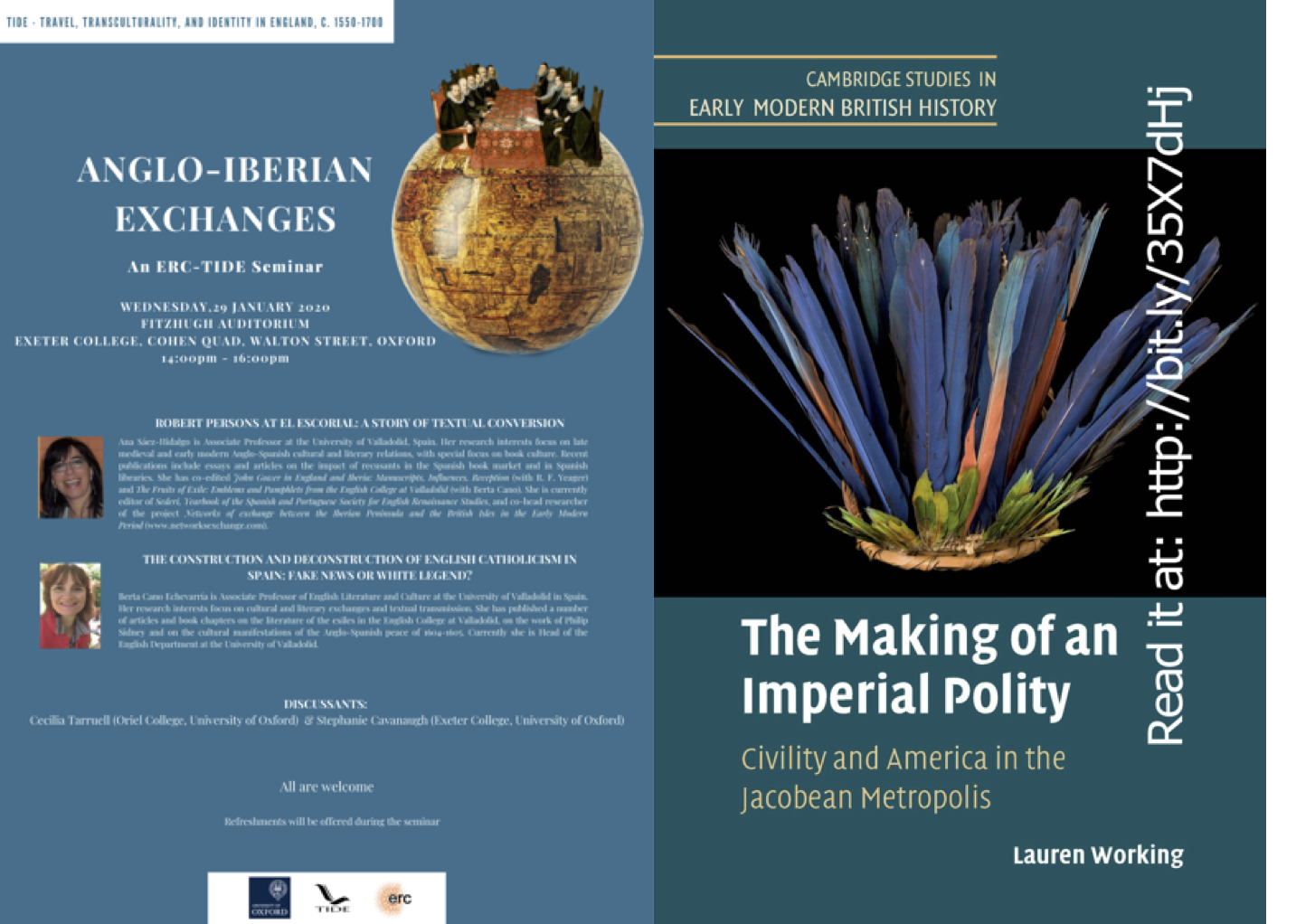
We warmly invite you to two events on Wednesday 29 January, both of which will be held at the FitzHugh Auditorium in the Cohen Quadrangle (Exeter College) on Walton Street.
TIDE seminar: Anglo-Iberian Exchanges
2-4pm
Popery, rumours, and a royal palace: our first TIDE seminar of term on the theme of ‘Anglo-Iberian Exchanges’ will feature papers by Ana Sáez-Hidalgo and Berta Cano Echevarría from the University of Valladolid, with Cecilia Tarruell (Oriel College) and Stephanie Cavanaugh (Exeter College) as discussants. Refreshments will be served. See the here for more details.
TIDE Annual Report and book launch
5.30-7pm
Join us as we celebrate the launch of TIDE's third annual report, and Lauren Working's newly-published book, The Making of an Imperial Polity: Civility and America in the Jacobean Metropolis (Cambridge University Press, 2020). This event will be followed by a wine reception.
We hope to see you at one or both events!
Wednesday, 29 January, at the FitzHugh Auditorium, Exeter College, Cohen Quad, Walton Street, Oxford OX1 2HE

We are delighted to announce that this year’s TIDE Visiting Writer is Dr Preti Taneja. Preti teaches writing in prisons and holds an honorary fellowship at Jesus College, Cambridge. From 2017-2019 she was a Leverhulme Early Career Research Fellow at Warwick University and in 2019 was the UNESCO Fellow in Prose Fiction at the University of East Anglia. Her novel We That Are Young (Galley Beggar Press) won the 2018 Desmond Elliot Prize for the UK’s best debut of the year. It was also listed for a number of other awards, including the Republic of Consciousness Prize for Small Presses, the Folio Prize, and the Prix Jan Michalski. It has since been published into several languages. One of the subjects Preti wishes to explore during her time on the project is what we mean by ‘self-translation’ in the early modern period, the process undergone when people move across borders and boundaries, physical and conceptual, visible and invisible. To keep up to date with Preti’s work with TIDE, be sure to follow @ERC_TIDE on Twitter.
TIDE is pleased to invite you to its first Oxford seminar and the first Early Modern English Literature Seminar of 2019/2020. The seminar will take place on 15 October at the T.S. Eliot Lecture Theatre, Merton College at 17:15.
This round-table session will discuss some of TIDE’s research into keywords and a few of the case studies that help to illuminate our fragmented understanding of cultural difference, transculturality, and the idea of ‘betweenness’ in the early modern period. TIDE: Keywords, including Agent, Alien, Ambassador, Broker, Denizen, Exile, Heathen, Interpreter, Mahometan, Savage, Settler, Spy, Stranger, Subject, Traitor, Translator, Traveller, and Turk (among others), can be found here: www.tideproject.uk/keywords-home.
More information can be found here: https://earlymodern.web.ox.ac.uk/events-for-current-term#collapse1544046
Join our very own Professor Nandini Das at the 31st SEDERI (Spanish and Portuguese Society for English Renaissance Studies) Conference held in La Laguna (Tenerife, Spain), on 6-8 May 2020.
The Conference theme is "Hells and Heavens of Early Modern England" and invites re-examinations of literal and figural representations of hells and heavens, from places to states, including conditions of supreme suffering or bliss. The Conference also aims at scrutinising divides and liminal sites in which antithetical agents associated with decadence and innovation emerged, coexisted, collided, overlapped, blended and reshaped transformative factors in early modern English society, its language, literature and culture.
For more information download the CFP here
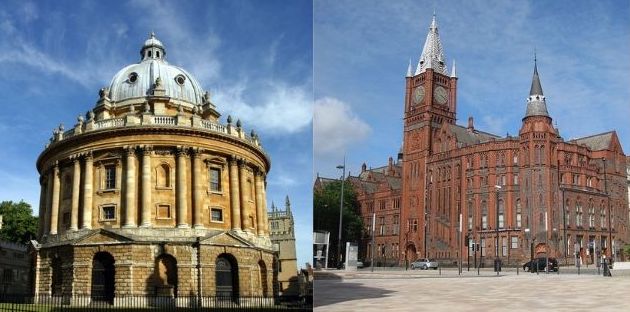
After three lively years at the University of Liverpool, TIDE will be moving at the end of the month to its new home at the University of Oxford.
Although we’re leaving, we are looking forward to continuing our collaborations with friends and colleagues at the University of Liverpool, the School of the Arts, the Centre for New and International Writing, the Everyman Theatre and National Museums Liverpool. At the same time, our move to Oxford is the beginning of an exciting new chapter for the project and the team. We are looking forward to starting the new academic year and making contact with old and new friends at Exeter College, the English Faculty, and TORCH.
We look forward to seeing you in Oxford at a TIDE event soon!
The TIDE Project (University of Liverpool) and the leading race equality think tank, The Runnymede Trust, have today published a report calling on the government to make the teaching of migration, belonging, and Empire, mandatory in secondary schools, and to provide teachers with the practical support and resources necessary to equip them to teach these topics sensitively and effectively.
The National Curriculum explicitly calls for pupils to be taught ‘tolerance’, as part of the British values agenda. It calls for young people to understand their own and others’ cultures ‘as an essential element of their preparation for life in modern Britain’, in which ‘they understand, accept, respect and celebrate diversity’. Teaching the long, diverse, often-fraught history of migration, belonging, and empire would help to achieve this. To adequately prepare students to be tolerant, confident citizens, these topics must be understood as integral both to our history and to the richness of British culture. All children and young people need to feel a sense of belonging, and understand their identities. Migration and empire are not marginal events, neither are they of interest only to specific communities within British society. They are central to a shared national story, and as it stands, the story we are telling is incomplete.
The report Teaching Migration, Belonging, and Empire in Secondary Schools, is based on extensive discussions with teachers, exam boards, and educators, and draws on TIDE and Runnymede's innovative 12-week TIDE Beacon Fellowship programme to support secondary school teachers actively engaged in teaching migration, belonging, and empire.
The full report is now available here. It explains why teaching migration, belonging, and empire matters. It outlines what is currently available on the curriculum and what is missing. It assesses the barriers teachers face in grappling with sensitive topics. Finally, it gives recommendations for change so that we can address the gaps in the curriculum for the benefit of students of all backgrounds.
Dawn Butler MP, is hosting and chairing a panel discussion in Parliament on Thursday, July 4 on the findings of the TIDE-Runnymede report and how the teaching of migration and Empire can be expanded and improved in schools.

What place does “civilised debate” have in today’s political climate?
Do ideas of civility hark back to colonial ideas of “civilising savages”?
TIDE visiting writer Nikesh Shukla joins Nish Kumar, Priyamvada Gopal, and Hussein Kesvani in Waterstones Piccadilly for a discussion on the merits of civilised debates, and whether absolutes can ever lead to nuanced conversation.
Nish Kumar is a critically-acclaimed comedian. He is the host of The Mash Report on BBC Two, co-host of The Bugle podcast and the Netflix series Joel & Nish Vs The World, and makes regular appearances on panel shows including Have I Got News For You, Mock The Week, and QI.
Priyamvada Gopal is University Reader in Anglophone and Related Literatures in the Faculty of English at the University of Cambridge and Fellow Churchill College. She is the author of Literary Radicalism in India and The Indian English Novel. Her latest work Insurgent Empire: Anticolonial Resistance and British Dissent upsets received views to show how rebellious colonies changed British attitudes to empire.
Hussein Kesvani is a journalist, editor and producer. He is the Europe editor of MEL Magazine, and has written for BuzzFeed, Vice, The Guardian, the New Statesman and The Spectator. He is the author of Follow Me, Akhi: The Online World of British Muslims, a rich exploration of the world of memes and influencers, Muslim dating apps, and alt-right Islamophobes that considers how a new generation of young Muslims growing up with the internet are using social media to determine their religious identity on their own terms.
Nikesh Shukla is a social commentator, critically-acclaimed author, and ERC-TIDE's visiting writer for 2018-19. He novels include Coconut Unlimited, which was shortlisted for the Costa First Novel Award 2010, Meatspace, The One Who Wrote Destiny, and Run, Riot. He edited The Good Immigrant, co-edited The Good Immigrant USA, and continues to edit The Good Journal. In 2017, he co-founded The Good Literary Agency to increase opportunities for under-represented writers.
Please join the TIDE team for what promises to be a fantastic evening of discussion. For more information download poster here.
Tickets available here.
Victoria Gallery & Museum - Leggate Theatre | University of Liverpool
Wednesday, 1 May 2019 from 17:00 to 19:00pm
Movement, Place and Meaning is the first of an annual series of public lectures presented by the School of the Arts at the University of Liverpool. The lectures showcase the research of the School and its relevance to the wider world. This year’s theme responds to urgent issues of our time that the Arts can help us better understand.
Professor Nandini Das from the Department of English presents 'The Stranger at the Door'. Strangers were everywhere in Tudor England. They sometimes crop up on the stage in the 1580s and 90s, in the guise of Jews and Turks and the occasional blackamoors and Indians. At the same time, English life and culture was being transformed by the first and second-generation continental Europeans who settled in Tudor England in large numbers. This lecture, part of a larger project about perceptions of identity, mobility, and belonging in sixteenth and seventeenth century England, examines Shakespeare’s Comedy of Errors against the backdrop of such dramatic predecessors and contemporary social and legal discourses about 'strangers', 'foreigners', and 'aliens'. How did you identify one? How long did one remain a stranger? And what happened when the stranger entered your everyday world, when ‘strangeness’, to borrow Geoffrey Hill’s evocative phrase, turned into ‘strange likeness’?
Please register your attendance here
The lecture will be followed by wine and nibbles.
All welcome!
Join the award-winning author Nikesh Shukla (The Good Immigrant), comedians Robin Ince and Josie Long and researchers from the University of Liverpool’s TIDE project for a conversation about identity, humour, and Englishness.
Playing on differences of culture and language has long been a mainstay of British comedy and debates about national identity, from the writings of second-generation migrants living in Elizabethan England to Fawlty Towers. At the heart of it all is the question of voice.
Who has a right to express themselves? Who is prevented from doing so? How does the subversive nature of comedy give space to these debates? Accents become battlegrounds for a range of social, cultural, and political concerns, magnified by innovations in social media from the first printing presses to Twitter.
Come along and revel in comedy's recklessness, power, and ability to probe our sense of belonging and identity, with some of the leading voices in comedy today.
Bookings available here.
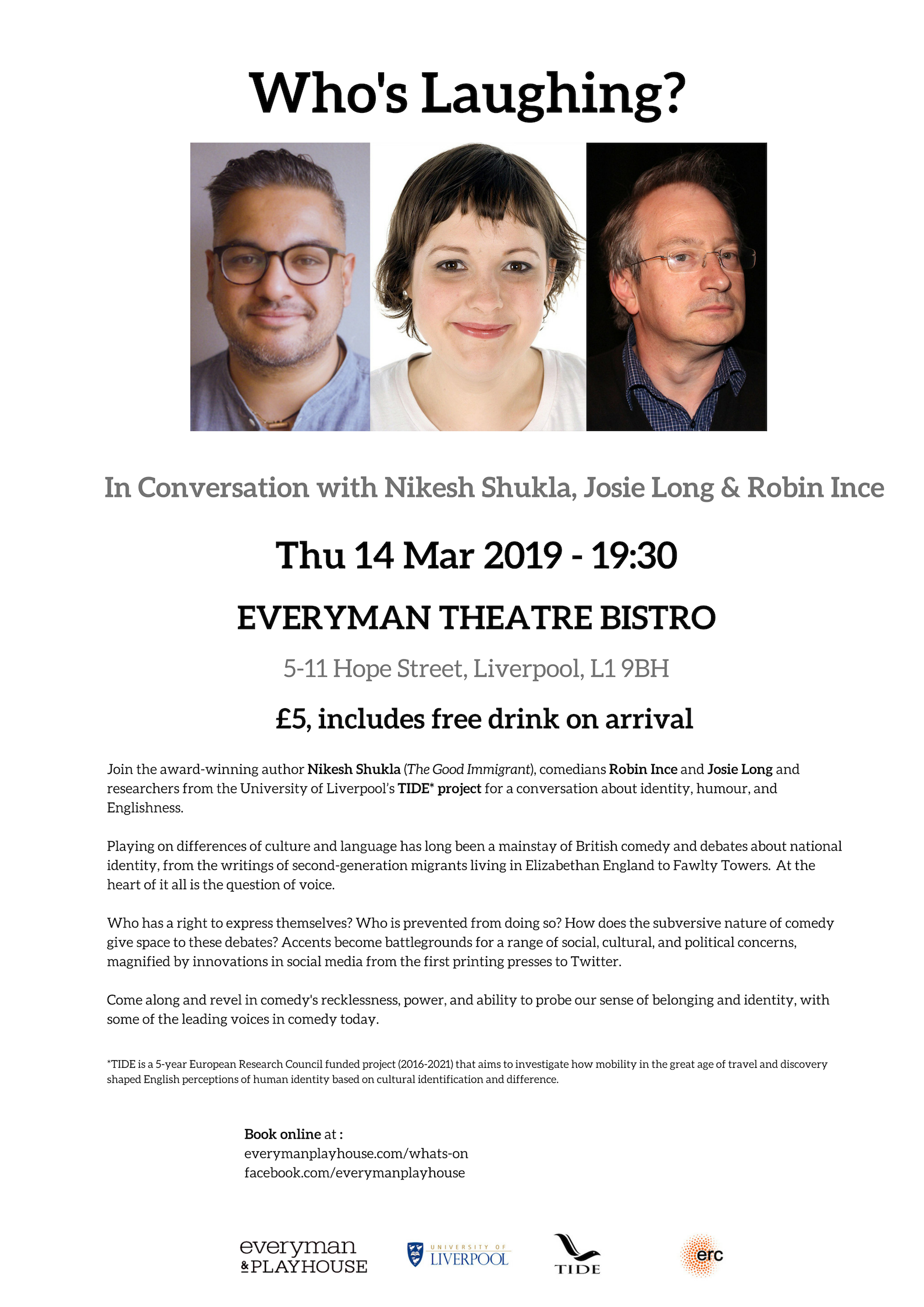
TIDE is pleased to invite you to its spring seminar on Monday, 25 March at 16:30 at the University of Liverpool's Campus in London.
Join us to hear William O'Reilly (University of Cambridge) on ‘"Soul Sellers". Migrant Recruiters, Traffickers and the Trade in Strangers in Europe and America in the 17th and 18th Centuries’ and Oliver Finnegan (Prize Papers Project/Carl von Ossietzky University), 'Conceptions of Piracy in Early Modern England' (see attached poster).
All are welcome. Tea and coffee will be served.
Monday, 25 March (16:30), at The University of Liverpools Campus, 33 Finsbury Square, London, EC2A 1AG.
Register here.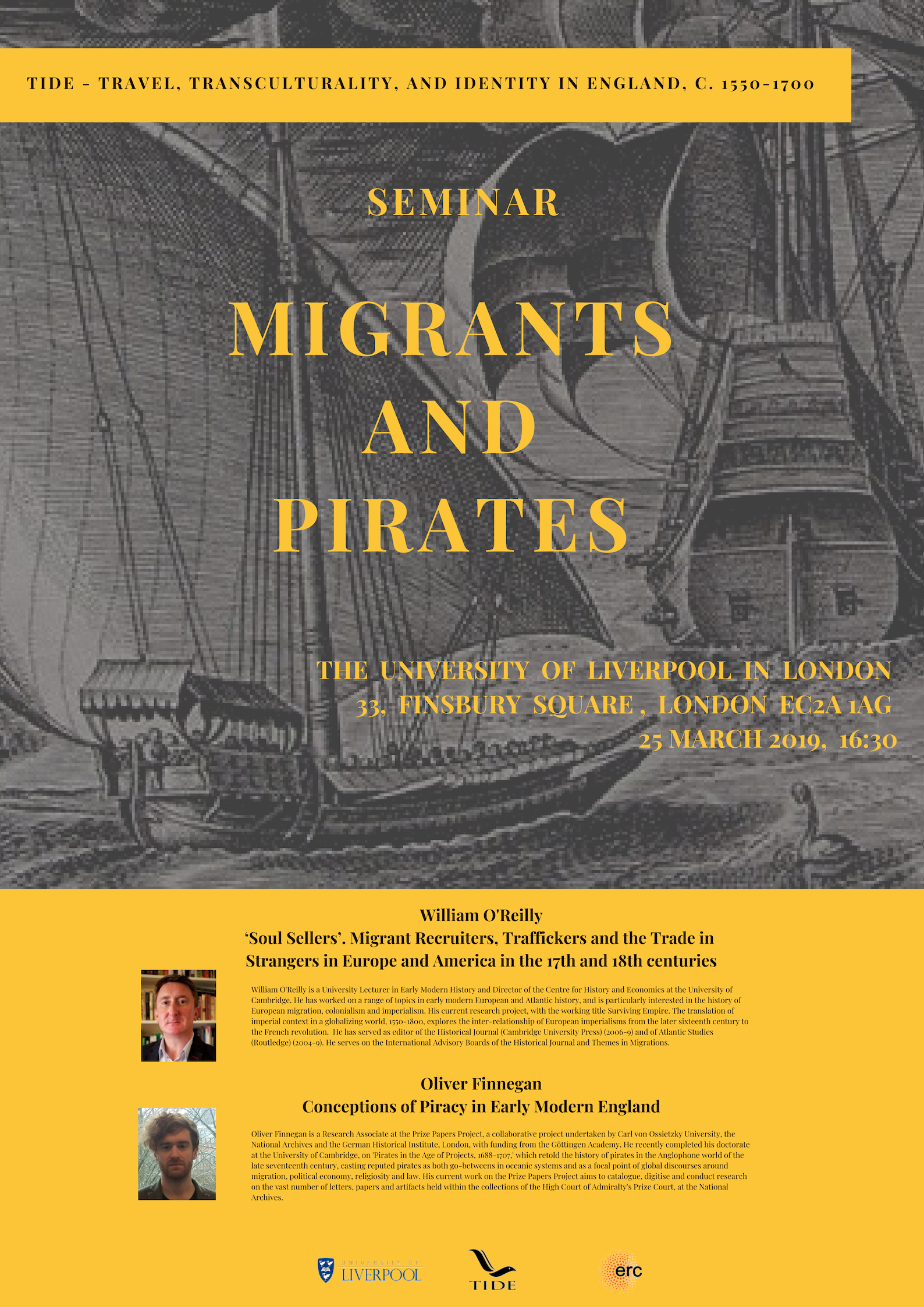
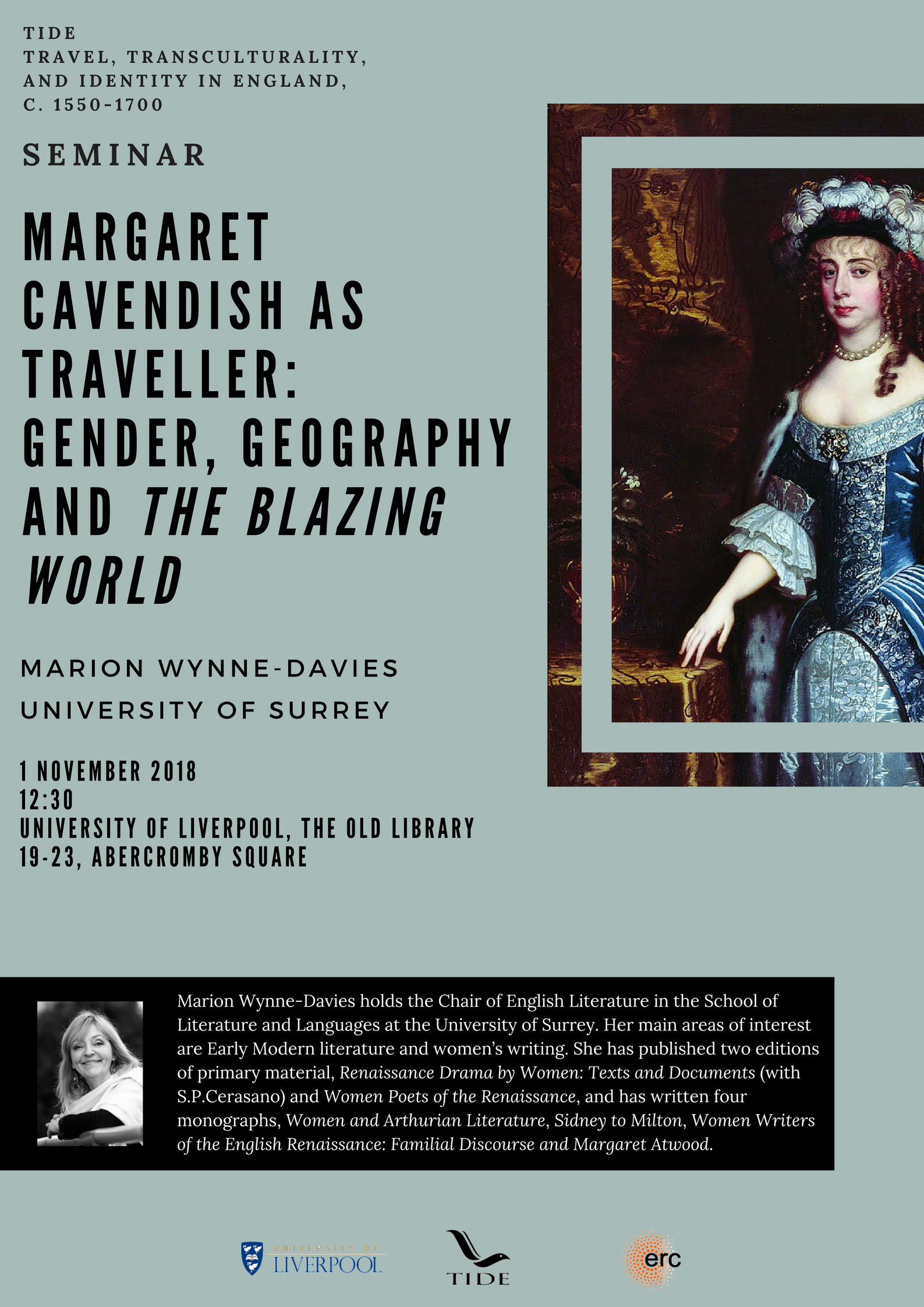
TIDE is pleased to invite you to its first seminar of this academic year on Thursday, 1 November at 12:30 at The Old Library.
Join us to hear Marion Wynne-Davis (University of Surrey) on ‘Margaret Cavendish as Traveller: gender, geography and The Blazing World’ (see attached poster).
All are welcome. Tea and coffee will be served; guests are invited to bring sandwiches to this lunchtime seminar.
Thursday, 1 November (12:30), at The Old Library, School of Arts, University of Liverpool, 19-23 Abercromby Square.
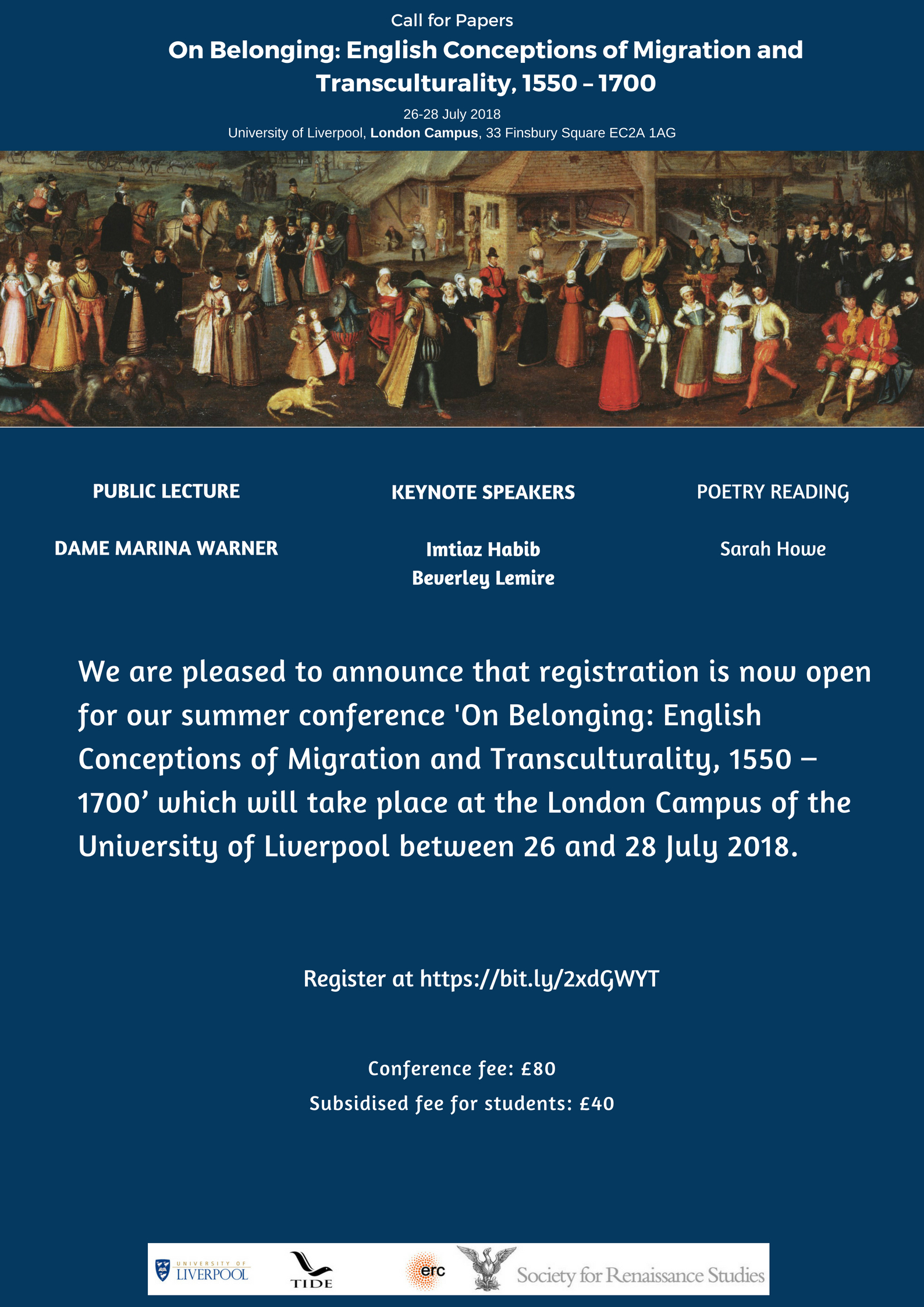
We are pleased to announce that registration is now open for our summer conference in London ‘On Belonging: English Conceptions of Migration and Transculturality, 1550 – 1700’ which will take place at the London Campus of the University of Liverpool between 26 and 28 July 2018.
Download a #Onbelonging programme here!
Confirmed speakers include: Marina Warner, Raingard Esser, Katy Gibbons, Imtiaz Habib, Claire Jowitt, Beverley Lemire, Gerald MacLean, Angela McShane, Sarah Knight, Barbara Ravelhofer, Edmond Smith
Register here
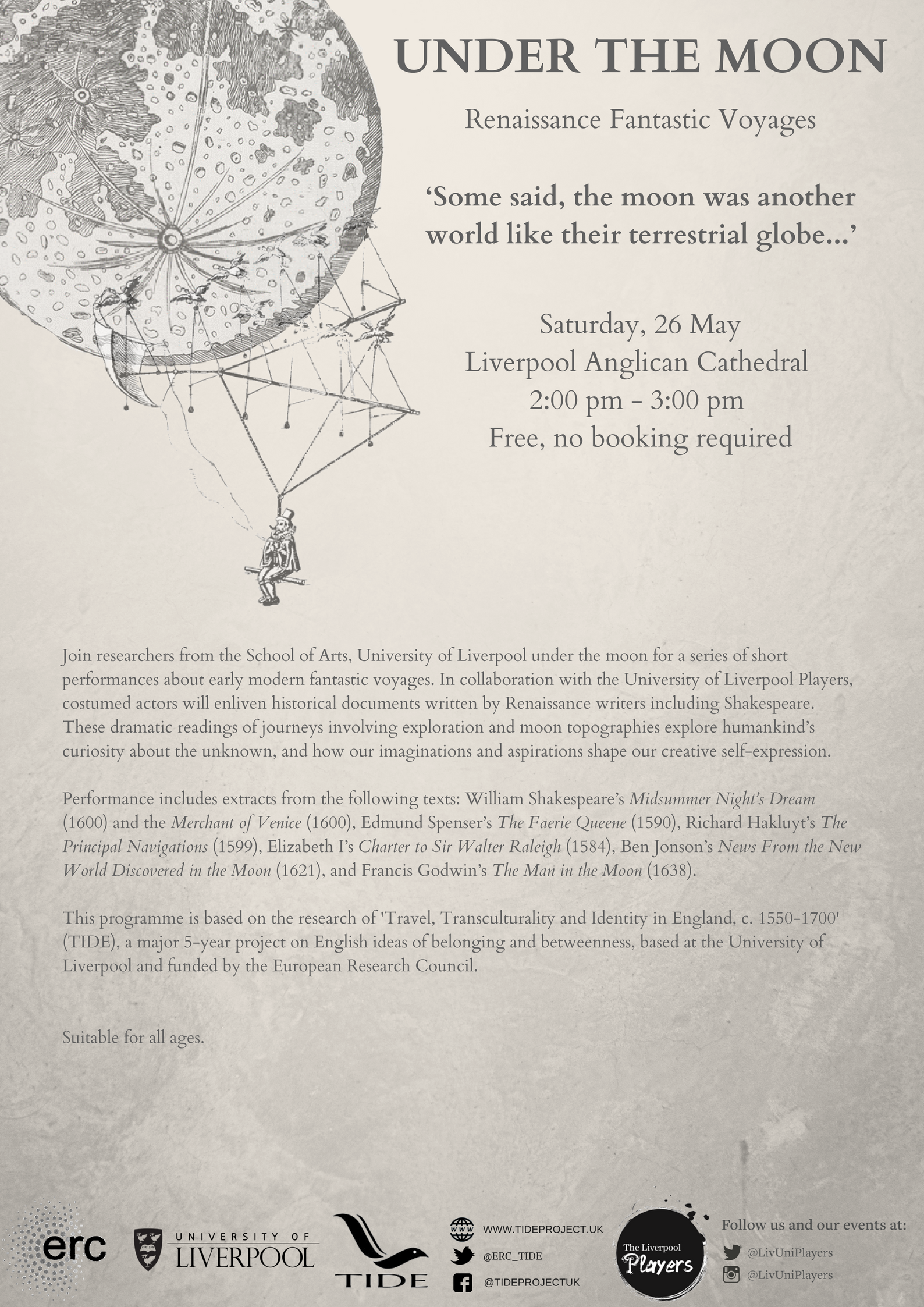
Join researchers from the School of Arts, University of Liverpool under the moon for a series of short performances about early modern fantastic voyages. In collaboration with the University of Liverpool Players, costumed actors will enliven historical documents written by Renaissance writers including Shakespeare. These dramatic readings of journeys involving exploration and moon topographies explore humankind’s curiosity about the unknown, and how our imaginations and aspirations shape our creative self-expression.
Performance includes extracts from the following texts: William Shakespeare’s Midsummer Night’s Dream (1600) and the Merchant of Venice (1600), Edmund Spenser’s The Faerie Queene (1590), Richard Hakluyt’s The Principal Navigations (1599), Elizabeth I’s Charter to Sir Walter Raleigh (1584), Ben Jonson’s News From the New World Discovered in the Moon (1621), and Francis Godwin’s The Man in the Moon (1638).
This programme is based on the research of 'Travel, Transculturality and Identity in England, c. 1550-1700' (TIDE), a major 5-year project on English ideas of belonging and betweenness, based at the University of Liverpool and funded by the European Research Council.
Suitable for all ages.
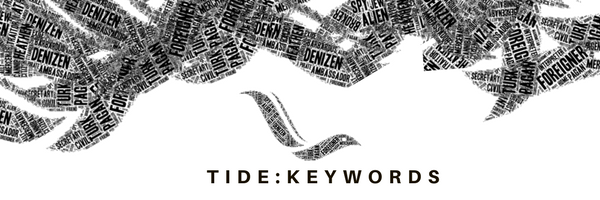
We are thrilled to announce the publication of TIDE's first major collaborative output -- the online, open access resource, TIDE: Keywords. Keywords is the product of 18 months of collaborative work by the whole TIDE team, producing 39 short essays on a selection of keyword terms covering topics related to language, Renaissance, travel, migration, religion, diplomacy, and national/cultural identity. The selection of words examined in TIDE: Keywords all reveal similarly complex histories of usage; in many cases, the concepts, preconceptions, and debates that they embody (or subsume) came to play seminal roles in articulations of identity, rights, and power in subsequent periods. Our aim is not to settle on a single definitive description, but to illuminate precisely the complexity – and often, the multiplicity – inherent in the usage of these terms in early modern English. Each essay and citation of usage offered here emphasises the fact that the terms in question share a certain slipperiness, that they are altered, revised and transformed repeatedly by multiple imperatives. TIDE: Keywords will continue to be a work in progress throughout the duration of the project, with new examples and interrogations added as fresh material emerges through our collective research.
Join us and Professor Sylvia Adamson (University of Sheffield) on 9 May for the launch of TIDE's open access keyword resource and an informal lunch time talk (bring your own sandwiches) on ‘Ideology and Language-change 1500-1800: Literary and Linguistic perspectives’.
Sylvia Adamson is Professor of Renaissance Studies at the University of Sheffield and TIDE Visiting Fellow for 2018. She has held Visiting Professorships at the University of Virginia and Naples and has been a Visiting Research Fellow at Oxford and Cambridge. She is considered the UK’s leading exponent of historical stylistics and has contributed to the Cambridge History of the English Language. Her published works include Reading Shakespeare’s Dramatic Language (Arden, 2001) and Renaissance Figures of Speech (Cambridge University Press, 2007). She is also contributing to updating Raymond William’s pioneering Keywords (Keywords for Today, Oxford University Press, in press), and is an advisor for TIDE: Keywords.
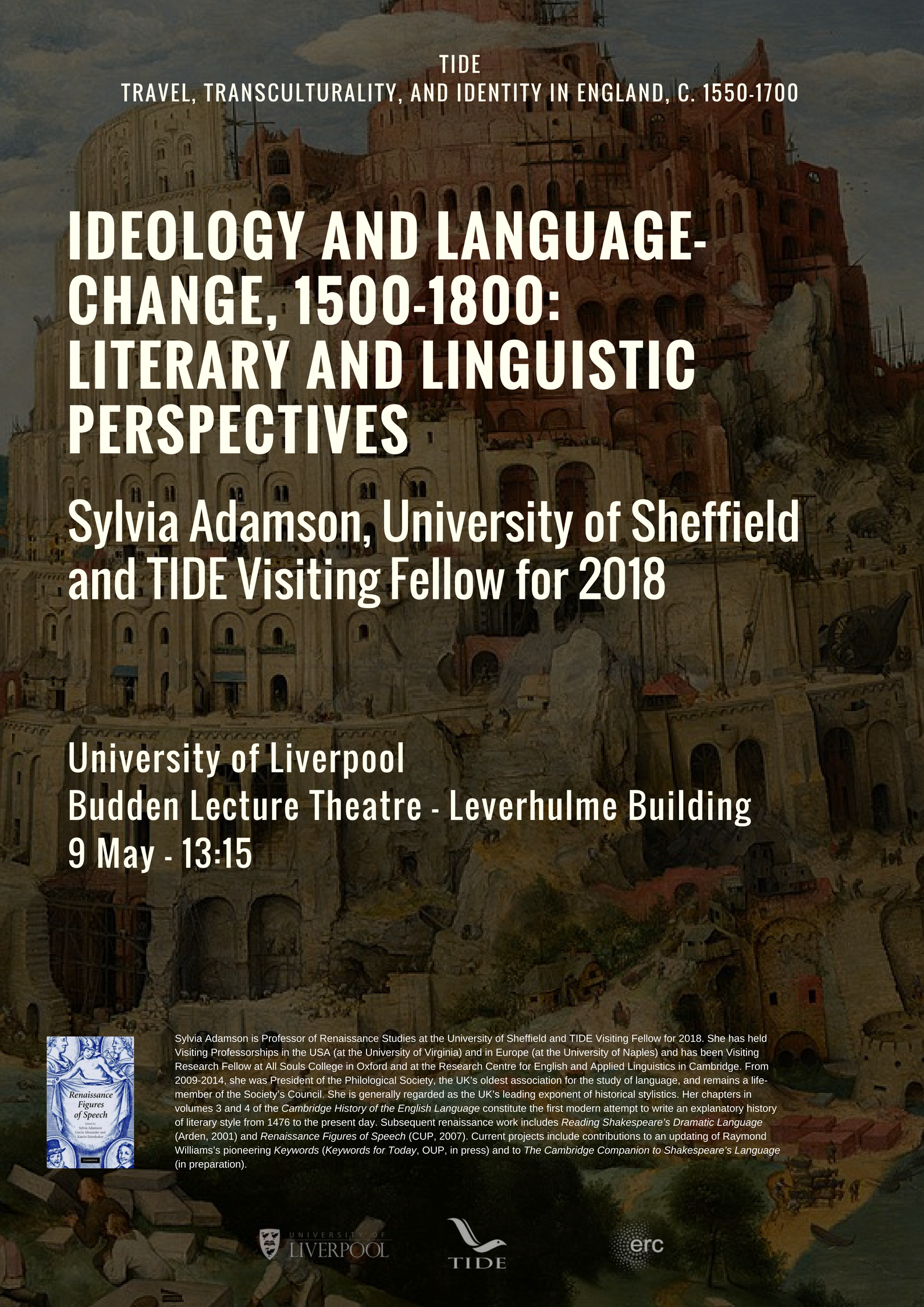
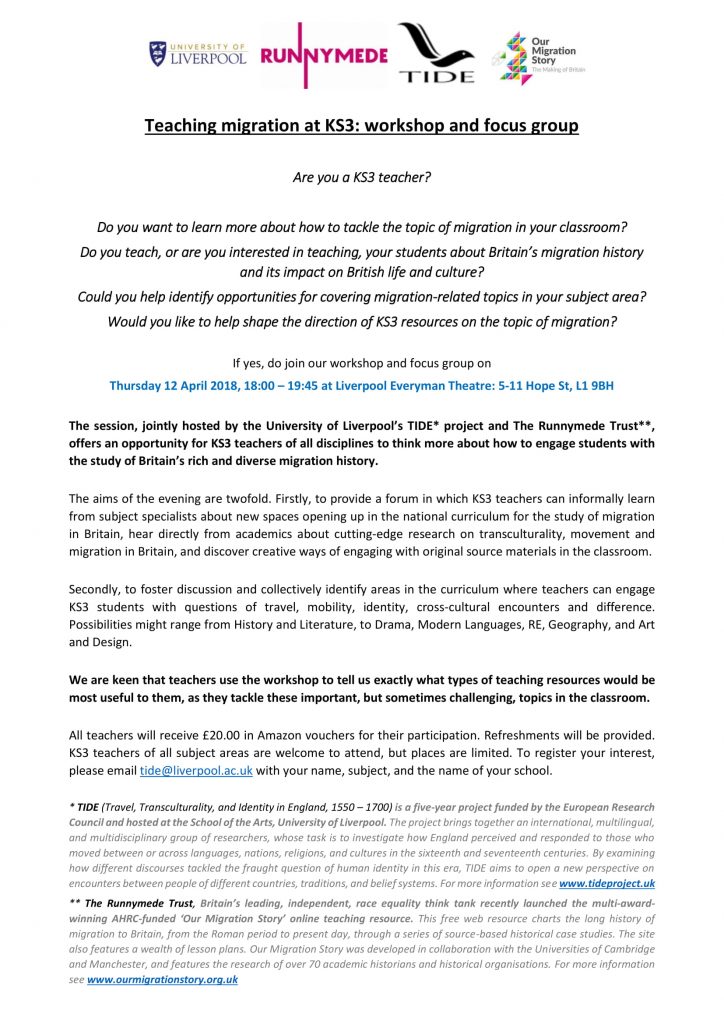
The 'Travel, Tranculturality and Identity in Early Modern England, c. 1550-1700' (TIDE)
project, an interdisciplinary, ERC-funded project at the University of Liverpool’s School of the Arts, considers questions of cultural assimilation and social cohesion, recurring themes in public and academic discourse as we face a seemingly unprecedented movement of peoples across the globe. The Runnymede Trust is the UK’s leading independent think tank on race equality and race relations. The Trust has extensive experience in working with schools and examination boards on related issues, with highly commended HEI partnerships working within the area of migration.From these discussions, we will develop school resources on early modern migration and belonging across multiple areas for the new GCSE modules on migration. As such, we are keen that teachers use this opportunity to tell us exactly what types of material would be most useful to them as they tackle these important but sometimes challenging, topics in the classroom.
To register your interest, please email tide@liverpool.ac.uk with your name, subject, and institution
.
TIDE is excited to announce that the award winning author Nikesh Shukla shall be joining TIDE as our 2018-19 writer in residence. Nikesh has authored three books and his latest work, The One Who Wrote Destiny comes out in Spring 2018. His debut novel, Coconut Unlimited, was shortlisted for the Costa First Novel Award 2010. His second novel Meatspace was released to critical acclaim in 2014. Nikesh has written for The Guardian, Observer, Independent, and BBC2, LitHub, Guernica and BBC Radio 4, among others. Nikesh is also the editor the bestselling essay collection, The Good Immigrant. He was one of Foreign Policy magazine's 100 Global Thinkers and The Bookseller's 100 most influential people in publishing in 2016 and in 2017, and is the co-founder of the literary journal, The Good Journal and The Good Literary Agency.
We are very pleased to announce that the eminent novelist, historian, and mythographer Dame Marina Warner will deliver a public lecture at TIDE’s July conference ‘On Belonging: English Conceptions of Migration and Transculturality, 1550 – 1700’ (26-28 July 2018).
We hope you had received our earlier call for papers. If not, please find attached an updated CfP with these and some other exciting news about our conference.
Details of the conference and a link to the Call for Papers can also be found here

Call for Papers: ‘On Belonging: English Conceptions of Migration and Transculturality, 1550 – 1700’, 26 - 28 July 2018
London Campus, University of Liverpool, 33 Finsbury Square EC2A 1AG
How did early modern processes of global exchange influence English identity? How did the movement of peoples, objects, and ideas across the globe shape English concepts of self and belonging, both at home and abroad? Join the ERC-funded ‘Travel, Transculturality, and Identity in England, 1550 – 1700’ (TIDE) project to explore these questions through a three-day interdisciplinary conference in summer 2018.
Download Call for Papers here.
Public Lecture
Dame Marina Warner
Confirmed Speakers
Raingard Esser
Katy GibbonsImtiaz Habib
Claire Jowitt
Beverley Lemire
Gerald MacLean
Angela McShane
Sarah Knight
Barbara Ravelhofer
Edmond Smith

Lauren has received a grant for a short-term residency at the Anthropology Library in the British Museum next spring, where she will be one of two RAI fellows for the upcoming year. Her research will focus on gaining a deeper anthropological understanding of Native American material culture, to better understand the role of indigenous objects in shaping discourses about Englishness and empire in the late sixteenth and early seventeenth centuries. How can historians learn to 'see' and interpret the indigenous artefacts that individuals collected, appropriated, and brought back to England, particularly in ways that restore greater agency to Native Americans and their systems of belief and knowledge-transmission beyond texts? How can the more nuanced study of Algonquian and Tupí artefacts - their colours, natural properties, and the technical production of pearls, shells, fur, and feathers - and the way the English used these objects shed light on early modern civility and consumption? The longer-term aim will be to link these initial encounters and artefacts to the afterlives of objects, encouraging greater dialogue among museums and visitors about the legacies of colonialism, and about the relationship between the Native American objects in domestic collections and national heritage. The RAI committee has commended Lauren for offering 'new perspectives on historical anthropology and the role that Native Americans and their material culture played in English people's conceptions of themselves, their nation, and their empire'.






